Search form

- Join / Renew
- Find / Post Job


NCA's Doctoral Program Guide
University of minnesota, department of communication studies.
The University of Minnesota's Department of Communication Studies continues a rich heritage of teaching and research that began in 1914 under the leadership of Frank M. Rarig and H. B. Gislason. Today, with 14 faculty members, about 50 graduate students, and over 600 undergraduate majors, the department pursues a wide range of interests including: the criticism of public discourse, interpersonal communication, language and gender, small group communication, discourse analysis, intercultural communication, mass media studies, feminist and African-American rhetoric, communication theory, and rhetorical theory.
Areas of Study
- Communication and Social Movements
- Critical Cultural Communication
- Critical Media Studies
- Environmental Communication
- Feminist Communication Studies
- Interpersonal and Organizational Studies
- Relational Communication
- Rhetorical Studies
QS World University Rankings—Communication & Media Studies
- #51-100 of 200 World Universities
URAP University Rankings—Language, Communication & Culture
- #38 of 300 World Universities
Admission Requirements
A bachelor's degree from an accredited college is required to apply to the doctoral program. Additionally, applicants must submit the following items.
- A strong statement of purpose telling us exactly why you want a graduate degree from our department
- A one-page statement on how you would contribute to the diversity of our student body
- Writing sample of academic nature
- Three letters of recommendation
- Unofficial transcripts
- TOEFL exam scores, if applicable
- An application fee
Graduate Faculty
- Professor Emerit Karlyn Kohrs Campbell, Ph.D., University of Minnesota
- Professor Ronald Walter Greene, Ph.D., University of Illinois
- Assistant Professor Atilla Hallsby, Ph.D., University of Georgia
- Professor Elaine Hsieh, Ph.D., J.D., University of Illinois
- Professor Susanne M. Jones, Ph.D., Arizona State University
- Assistant Professor Zornitsa Keremidchieva, Ph.D., University of Minnesota
- Professor Ascan F. Koerner, Ph.D., University of Wisconsin Associate
- Professor Kate Lockwood Harris, Ph.D., University of Colorado
- Professor Laurie Ouellette, Ph.D., University of Massachusetts
- Professor Emerit Mark Pedelty, Ph.D., University of California, Berkeley
- Associate Professor Gilbert B. Rodman, Ph.D., University of Illinois
- Professor Emerit Catherine Squires, Ph.D., Northwestern University
- Professor Mary Douglas Vavrus, Ph.D., University of Illinois
- Assistant Professor Emily Winderman, Ph.D., University of Georgia
- Assistant Professor Deborah Yoon, Ph.D., Rutgers University
NCA Awards Received by Faculty and Students, 2000-present
- Ecroyd Award for Outstanding Teaching in Higher Education, 2010
- Diamond Anniversary Book Award, 2003, 2009
- Miller Outstanding Doctoral Dissertation Award, 2002, 2008
- Golden Anniversary Monograph Award, 2005
- Golden Outstanding Student Essay in Rhetoric Award, 2015
- Winans-Wichelns Award for Distinguished Scholarship in Rhetoric and Public Address, 2009
- Woolbert Research Award, 2013, 2016
- Twin Cities
- Other Locations
University Catalogs
This is archival data. This system was retired as of August 21, 2023 and the information on this page has not been updated since then. For current information, visit catalogs.umn.edu.
Twin Cities Campus:
- Parking & Transportation
- Maps & Directions
- Directories
- Contact U of M
© 2024 Regents of the University of Minnesota. All rights reserved. The University of Minnesota is an equal opportunity educator and employer Information current as of May 16, 2024
- Skip to primary navigation
- Skip to main content
CollegeRank.net
Best College Rankings
Best PhD Communications Degrees

Quick Highlights:
- Our #1 ranked school for a PhD in communications is Temple University , followed by Purdue University .
- These programs prepare students for advanced careers in academia , research, and various industries.
- Many programs offer interdisciplinary study options , allowing students to combine communications with other fields.
- Graduates are equipped for diverse roles in marketing, government, education, and more.
Communication is one of the broadest areas of study that can lead to numerous well-paid and secure careers, and earning your PhD in this discipline could help you to reach the most coveted roles.
With a PhD in Communications, you’ll be ready to pursue rewarding careers in academia, research, and numerous other fields. Your strong understanding of how meaning is conveyed across different contexts, social groups, and technologies means you could also find great success in marketing careers, government organizations, and many other industries. Let us help you make a decision abut doctoral programs.
- Top PhD in English Programs
- Best Creative Writing MFA Programs
What Are the Best PhD in Communications Degrees?
At CollegeRank , we strive to do our best to guide you and your family toward a fruitful academic career. The pursuit of knowledge is a noble one, and we want to help you reach your goals. Please feel free to visit our dedicated methodology page for a step-by-step breakdown. For questions, comments, badge downloads, or data corrections, please feel free to reach out to us at [email protected].
Whether you are studying communication theories, strategic communications or an interdisciplinary field, there are doctoral programs for you.
Best Communication Doctoral Programs
Temple university.
Philadelphia, Pennsylvania
Average Net Price

Founded in 1884 as a night school for working professionals, Temple University has advanced to become one of the leading institutions in the nation, with around 40,000 students attending annually. Both undergraduate and graduate programs are available at the Philadelphia campus, with a total of around 500 programs offered.
Temple University’s top PhD in media and communication degree program integrates studies in a range of areas, including social sciences and the humanities. This doctoral program will prepare PhD students for careers in education, consulting, finance, and others. In addition to working closely with your peers, PhD students will contribute to faculty research and publications.
Courses and areas of study will cover research areas like:
- Political communication
- Laws and policies relating to the media industry
- Emerging media and technology
- Global media
- Information and communication technologies
- Strategic communication
You’ll also have access to and benefit from guest speakers and events such as Best Practices for Publishing Journal Articles. Temple University was ranked among the 100 Best Values in Public Colleges by Kiplinger’s Personal Finance in 2017.
Purdue University
West Lafayette, Indiana

Ranking highly among the nation’s most innovative universities, Purdue University was founded in 1862 and continues to celebrate its rich history and traditions to this day. Examples include the institution’s on-campus, annual Grand Prix event, in addition to the official song sung by students: “Hail Purdue”.
PhD students may earn a non-thesis or thesis-based master’s degree in addition to their dissertation-based doctorate. This can be in one of five specializations and research areas, including:
- Health communication
- Interpersonal communication
- Organizational communication
- Media technology & society
- Public relations
What’s more, there are opportunities available for cross-discipline study. Purdue’s School of Management allows you to combine your communications program with studies in human resource management. Other options include:
- gerontology
- information security
This highly flexible doctoral program structure allows you to tailor your program to your career aspirations.
Rutgers University
New Brunswick, New Jersey

Rutgers was established in 1766, making it the eighth oldest institution of higher education in the nation, with a study body nearly 70,000-strong. Based at the New Brunswick campus of Rutgers University, the School of Communication and Information (SC&I) was established in 1982. It has one of the top communication doctoral programs.
The top PhD in communication, information, and media at Rutgers University offers three areas of concentration:
- Communication
- Library and information science
- Media studies
The curriculum focuses on information and media organizations and their processes, policies, and technology, in addition to how these organizations and processes relate to society and individuals.
The communication concentration focuses on research connected to five research areas:
- Communication and technology
- Language and social interaction
Faculty members include nationally and internationally recognized experts, many having received article, book, and career awards for their research areas.
Louisiana State University
Baton Rouge, Louisiana

Louisiana State University first opened its doors to students in 1860 under the name Seminary of Learning of the State of Louisiana. Programs are offered at both the graduate and undergraduate levels, and over $300 million in financial aid is given to students each year. In fact, around two-thirds of the student body graduates without student debt.
LSU’s PhD program in communication is offered via the LSU department of communication studies. In addition to the PhD and several master’s degree options, prospective students can enroll in the M.A. to PhD fast track program, which results in both qualifications. Upon acceptance into the doctoral program, PhD students will work with the graduate committee to develop your individualized curriculum.
The standard PhD track comprises 72 credit hours, including examinations and a dissertation; it’ll take around 4 years to complete or 7 years maximum (part-time). Through required core courses, PhD students gain a foundation in subjects such as:
- research writing
- communication theory
- strategic communication
Ohio State University
Columbus, Ohio

Prospective PhD students wishing to attend Ohio State’s doctoral program must already have a four-year bachelor’s degree or equivalent from an accredited institution. You’ll also need to evidence a minimum 3.0 cumulative GPA, in addition to providing transcriptions and evidencing successful completion of the GRE or GMAT.
The coursework you’ll complete in this top communication PhD program focuses on providing a solid foundation in communication theory, in addition to how this existing knowledge can be used to generate new learning through research activity. You will have the opportunity to attend professional conferences, and you will design, plan, execute, and publish your own research findings.
You’ll be mentored by distinguished scholars and guided in creating your own personalized program of study, emphasizing areas where your own interests meet those of the faculty. During your doctoral studies, you will also be encouraged to collaborate with world class faculty members and contribute to both journal articles and papers.
University of Minnesota
Minneapolis, Minnesota

The University of Minnesota has one of the top doctoral programs for communication. It has an annual enrollment of around 50,000 students, supported by 20,000 dedicated staff and faculty. Founded in 1851, the main campus – Twin Cities – is located on the banks of the Mississippi and is one of the only five universities in the country to boast dedicated schools for engineering, medicine, law, and veterinary studies on a single campus.
While this communications PhD program is designed to be completed in five years, you may be able to complete the doctoral program in four years if you hold a master’s degree in communication studies. The PhD curriculum focuses on the connections between each subfield in the discipline of communication.
Your first year of study will focus on foundation knowledge and central concepts and theory in communication. In year two, you’ll take courses related to your specific research interests and write a literature review to a publishable standard. Year three requires completion of the remaining coursework, with your final two years dedicated to dissertation work.
University at Buffalo
Buffalo, New York

Students at the University at Buffalo benefit from a huge range of opportunities outside of the classroom. Student clubs and organizations are vast, with more than 600 available to choose from. There’s also a Division I athletics program, regularly scheduled music concerts and other events, and frequent guest speakers present on a range of topics. UB has one of the best communication doctoral programs.
Coursework in this doctoral program focuses on research methodologies and the theory of communication, with students prepared to take on research-based positions in a range of industries. Unlike other doctoral programs that specialize in areas such as mass communication or speech theory, this curriculum is aligned with the faculty’s research interests.
Graduate students are required to complete a minimum of 36 credit hours of coursework beyond the master’s program curriculum, maintaining a QPA (quality point average) of at least 3.0. You will also be expected to complete research electives, department electives, and free electives, in addition to producing two publication-quality research papers.
University of Illinois at Urbana – Champaign
Champaign, Illinois

Founded in 1867, the University of Illinois Urbana-Champaign today welcomes around 47,000 students annually from around the globe. It has risen to become one of the top 15 ranked public universities and was the birthplace of the first graphical web browser. UIUC also counts 29 Pulitzer Prize winners among its alumni.
The faculty at the University of Illinois’ Institute of Communications Research (ICR) come from three academic departments:
- Advertising
- Media and cinema studies
They’re also engaged with numerous interdisciplinary activities across campus, meaning you’ll receive a broad and well-rounded program of study in this program.
Admission to the PhD in communications and media requires that prospective students have either a bachelor’s or master’s degree that relates to an area within the humanities, physical sciences, or social sciences. The program itself requires the completion of 64 credits of dissertation research and coursework for those who already hold a master’s degree.
University of Oklahoma
Norman, Oklahoma

Students at the University of Oklahoma have a choice of more than 400 clubs and organizations, organized events on-campus, and broad athletic programs. With a campus located close to the welcoming community of Norman, OK, and just a half-hour outside of Oklahoma City, you’ll never be short of activities outside the lecture hall.
This PhD communication program allows specialization in one or more areas of interest. These research areas include:
- Intercultural/international communication
- Interpersonal communication and social influence
- Political/mass communication
- Communication technology
The PhD program requires a minimum of 90 semester hours beyond the bachelor’s degree level.
PhD students enrolling in this program are required to take a number of core courses, in addition to earning 32 hours of coursework within a concentration of their choosing. Core courses include:
- Quantitative Research Methodology
- Advanced Statistics
- Qualitative research methods
- The History and Theory of Communication
- Information and Communication Technologies
- Strategic Communication
Florida State University
Tallahassee, Florida

Florida State University (FSU) has been ranked a top 10 university for best value by Kiplinger’s Best College Values. It’s also known for having the highest four-year graduation rate among the state’s public universities. The institution excels in particular in the arts and sciences.
Including 48 credit hours of graduate coursework and at least 24 hours of dissertation project work, this PhD communication program provides you with a core set of common courses that will provide a broad understanding of the field of communication, and the methodological, philosophical, and theoretical aspects of communication scholarship.
Florida State’s doctoral program offers supervised teaching opportunities, often including teaching at an undergraduate level in communication. You’ll also gain training in essential skills such as classroom management and research skills, which would be invaluable for any future university instructors. Regular workshops are also offered, which focus on innovation in e-learning methods.
North Carolina State University
Raleigh, North Carolina

North Carolina State University at Raleigh (NC State) is part of the University of North Carolina System and was founded in 1887. The student body comprises more than 35,000 learners and the institution specializes in programs in the humanities, social sciences, and teaching and research, making it an excellent choice for communications majors.
NC State’s communication and English department is located within the Research Triangle, a growing community and highly regarded location of innovation and research in Raleigh, North Carolina. In this program, you’ll gain both teaching and research experience, and you’ll benefit from a flexible curriculum of core elective courses and seminars.
The communication, rhetoric, and digital media (CRDM) faculty engages with other research departments and organizations within the Research Triangle, providing a wealth of expertise and experience for you to benefit from. You’ll cover subfields including:
- new communication media
- the cultural, political, and social aspects of information technology
Indiana University – Bloomington
Bloomington, Indiana

Indiana University Bloomington has over 700,000 graduate alumni who have benefited from nearly 400 study abroad programs and more than 750 student organizations. The university participates in 24 sports, with students known as Hoosiers. They also have a choice of more than 200 undergraduate programs and nationally recognized graduate programs.
This PhD in media arts and sciences comprises 90 credits and provides a broad and customizable curriculum that can lead into many varied careers. It’s one of the top research doctoral programs in media and communication, featuring small class sizes and a leading faculty.
As part of the admission requirements, you’ll need to have a four-year bachelor’s and two-year master’s degree with a minimum GPA of 3.5 at the master’s level. You will also need:
- recent GRE scores
- three letters of recommendation
- a statement of purpose
- a writing sample
- a copy of your curriculum vitae
The closest estimate you can get for tuition and fees at Indiana University Bloomington is by looking at the previous year’s expenses. Alternatively, you can get a reasonably accurate idea of your tuition and fees by using the university’s costs calculator on their website .
North Dakota State University
Fargo, North Dakota

Ranked within the top 100 public research universities, North Dakota State University (NDSU) features within the National Science Foundation’s top 100 for numerous areas of study, including the sciences, business, and communications. Accredited by the Higher Learning Commission, the institution has a total enrollment of around 13,000 students.
The NDSU doctoral degree in communication is highly competitive. You’ll enroll in:
- as many as 12 credit hours prior to completing an application
- 60 credit hours beyond master’s level
- 30 credit hours in research theory or other content within your concentration
- 15 hours relating to research methodology
You will also be expected to complete a dissertation (15 credits).
By graduation, doctoral students have typically published two to three papers or journal articles, in addition to having presented at more than one convention. This doctoral program will also give you a solid understanding of learning and teaching, making it ideal for those looking to secure a role as a university instructor.
The University of Alabama
Tuscaloosa, Alabama

The University of Alabama was the state’s flagship university, having been founded nearly 200 years ago in 1831. Situated on a stunning 1,200-acre campus, the university boasts more than 600 student clubs and organizations, plus a broad range of opportunities for volunteering or completing an internship.
PhD students enrolling in the PhD in Communication and Information Sciences can select from one of three signature research areas of the faculty:
- Emergent media
- Sports communication
Alternatively, you can opt to partner directly with members of the faculty, focusing on research activities pursued by these instructors.
What’s more, you can tailor your coursework to specific areas of concentration that include:
- applied communication
- book and publishing studies
- health communication
- interpersonal communication
- media studies
There’s more information about each of these concentrations and their focus on the university’s program page.
The University of Illinois at Chicago
Chicago, Illinois

As a freshman at the University of Illinois at Chicago, you’ll receive an introduction to campus life at orientation, and you’ll need it; located minutes from the Windy City, there’s always plenty to get involved in. More than 33,000 students attend this best value and most diverse university annually.
For admission into the PhD in communication, you must already have a master’s degree in communication or a similar field, in addition to holding an average GPA of 3.0, or 4.0 for your final 60 semester hours. Other requirements include the need to submit GRE general scores and provide three letters of recommendation.
You’ll choose one or more specializations in common subfields of communication, and it’s also recommended that you enroll in two courses in research techniques that are specific to your chosen specialization. After graduation, you can also choose to enroll in further concentrations to complement your degree, including:
- Black studies
- Gender and women’s studies
- Latin American and Latino studies
University of Massachusetts-Amherst
Amherst, Massachusetts

Situated in Amherst, Massachusetts, UMass Amherst is regularly ranked within the top research institutions in the country. It was also recently ranked at number 26 in a list of the best national public universities by U.S. News & World Report . More than 13,000 students attend UMass Amherst annually.
For successful completion of this doctoral program, you’ll be required to complete a minimum of 60 credits beyond the bachelor’s level, in addition to a further 6 or more credits in research tools or methodologies. You will also be expected to plan, research, and complete a dissertation project of your own choosing.
This communication studies doctoral program offers a particularly large number of specializations to choose from—14 in total—which include unique specializations such as feminist studies and performance studies. For more information on the potential specialization options, check out this page on the university’s website.
The per-credit rate for tuition and fees at the University of Massachusetts Amherst depends on the number of credits being taken. For example, a single credit is only marginally cheaper than two credits, as the rates work on a sliding scale. Non-residents typically pay around twice what state residents will pay.
Michigan State University
East Lansing, Michigan

Michigan State University has been welcoming students through its doors for more than 160 years. Ranked as a top public U.S. university, top 100 global university and receiving a gold sustainability rating, MSU produces highly competent graduates who have a 93% placement rate, almost 12% higher than the national average.
According to the program page, this doctoral degree in communication is considered one of the most prestigious programs of its kind in the world. Designed to last for four years, the PhD program requires the completion of a dissertation and regularly sees graduates offered roles in research centers, government organizations, and higher education institutions across the globe.
After completion of the core courses, doctoral students typically specialize in:
- social media
- social influence and persuasion
- communication analytics
- organizational communication
Alternatively, you can also choose to specialize in hospitality research and hospitality program teaching.
George Mason University
Fairfax, Virginia

Founded in 1972, George Mason University is a private research institution that has fast become a respected university within the state of Virginia. The student body hails from 130 different countries and totals around 37,000 students. Around $150 million in research takes place each year and 80% of graduates find employment within 6 months of graduation.
While a master’s degree in a related field is a prerequisite for this program, it means that you can graduate with the doctorate after successful completion of just 60 credits. Otherwise, the PhD program comprises 90 credits and involves the completion of a dissertation research project.
You’ll work alongside faculty members to develop essential research relating to health and strategic communication. You’ll study:
- the consumer-provider relationship
- crisis communication
The program-specific requirements for this PhD include:
- submission of college transcripts
- an updated resume
- three recommendation letters
University of New Mexico
Albuquerque, New Mexico
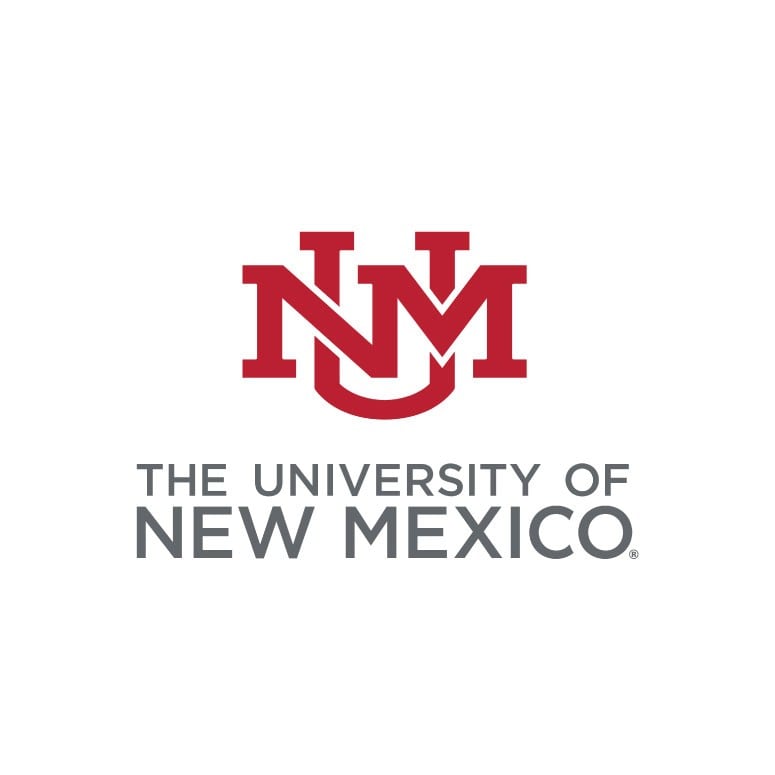
Founded in 1889, The University of New Mexico offers more than 90 undergraduate degree programs and is within the top 20 for two of its programs. Over $70 million in scholarships were awarded to students in the recent incoming freshman year, for which you may qualify after completing the FAFSA .
This PhD program applies the study of communication and culture, and how the two interrelate. Specifically, you’ll look at media studies, health communication, and critical intercultural studies. You’ll complete coursework such as Strategic Communication and Research Methodologies totaling 36 hours, in addition to committing a further 18 hours for your dissertation project.
Upon acceptance into the program, the world-class faculty will help you to design a program of study that closely relates to your aspirations and interests. Faculty members include award-winning instructors whose work has been recognized on both the national and international stage, so you’ll be guided well throughout your program.
University of Colorado Boulder
Boulder, Colorado

Part of the Association of American Universities (AAU), the University of Colorado Boulder was established in 1876 and has since grown to include its own natural history and art museums. Among its alumni are three U.S. Supreme Court justices, five Nobel Prize winners, and five National Medal of Science winners.
This PhD program has been designed to follow a master’s degree, preferably within the same discipline. Assuming that you have completed a master’s within a related area, you could complete this doctoral degree in as few as 3 to 4 years.
Through this doctoral program, you’ll gain a broad understanding of four subject areas. You’ll gain:
- a broad foundation in communication
- develop advanced knowledge of a specific specialization area and one primary research methodology
- expertise in a secondary specialization
University of North Dakota
Grand Forks, North Dakota

The University of North Dakota was founded in 1883, which was six years prior to the state of North Dakota being established itself. Sitting on a 521-acre campus, the institution has more than 250 student clubs and organizations, welcomes around 13,600 students annually, and is the largest university in North Dakota.
Comprising 90 credit hours and taking an average of 3 to 5 years to complete, this communication doctoral degree is led by a faculty with expertise in:
- interpersonal and persuasive communication
- risk and crisis communication
- communication across digital channels including social media
As part of your application, you will be expected to submit your GRE general scores. You will also need to provide a statement of goals that outlines your motivations and career aspirations, in addition to submitting an original academic paper of around 10 to 15 pages in length.
Wayne State University
Detroit, Michigan

Wayne State University heavily emphasizes diversity and inclusion among its students, or Wayne State Warriors. Multiculturalism is encouraged, with students representing more than 75 countries around the world. In fact, this university has the most diverse student body of any other institution in Michigan.
This PhD program offers specialization in five areas:
- Democratic participation & culture
- Identity & representation
- Media, society, & culture
- Risk, crisis, & conflict
- Wellness, worklife, & relationships
You will choose either one or two areas of specialization in which to focus more of your studies and research activity.
Throughout this doctoral program, PhD students are required to complete a minimum of 30 credits of PhD coursework; at least two-thirds of these must be gained from the department of communication. And you’ll need to maintain a minimum GPA of 3.0 to successfully graduate from your program.
University of Oregon
Eugene, Oregon

Situated a short distance from the Cascade Mountains and situated in the Willamette Valley, the University of Oregon comprises 9 schools and colleges and welcomes around 22,500 students annually. A third of freshmen are first-generation college students, holding an average GPA of around 3.65.
When you enroll in this PhD communication program, you’ll work directly with the faculty as a co-author and teacher, contributing your own research alongside recognized names in the communications and media industry. Under the guidance of this R1 research institution, you’ll have expert instruction in areas like:
- global media
- journalism studies
- technology and society
This is also a fully funded research degree, meaning the institution will take care of your tuition. You’ll be funded for four consecutive years of study. Funded students receive a monthly stipend varying between $1,400 and $1,575. As part of this benefit, you’ll contribute 16 hours per week towards teaching and research activities.
New York University
New York City, New York

Founded in 1831, New York University (NYU) welcomes students from almost every state in the nation and more than 130 countries worldwide. The institution has campuses in both Shanghai and Abu Dhabi, in addition to 11 other study-abroad sites across the globe. In total, NYU has more students studying abroad than any other university in the United States.
This heavily technology-driven doctoral program will prepare you for leadership or academic careers in the areas of research, education, and technology. You’ll employ the use of multimedia learning scenarios and conduct research into the learning processes that relate to groups and individuals that work with these environments.
Available as a part-time or full-time program, and comprising 57 credits, this program features coursework in the areas of learning sciences and cognitive sciences. PhD students have the opportunity to work closely with preeminent scholars in this discipline, while conducting their own, original research on how technology is employed for learning purposes.
University of Pennsylvania

Founded in 1740, the University of Pennsylvania employs a faculty nearly 5,000-strong, which helps keep class sizes low; there’s a 6:1 student-faculty ratio. Students participate in everything from clubs and organizations, to Greek society, and a student government. Penn State is also a member of the Ivy League, with many athletic pursuits available.
According to the university’s website, the Annenberg School for Communication has been ranked for the nation’s best doctoral program due to a world-class faculty and well-designed curriculum that allows for highly individualized study. Many PhD graduates are already known nationally or internationally upon graduation.
This communication research degree program lasts for five years and will require you to take introductory courses in both statistics and research methods, in addition to completing the core courses. You’ll need to complete a dissertation proposal and comprehensive examinations in order to progress to the dissertation phase.
Drexel University

Drexel University is among the nation’s largest private institutions with a student body of around 25,000 learners. Comprising a 74-acre main campus, the university is located in a bustling urban city and has numerous other campuses and partnerships elsewhere. Drexel was founded in the 1890s, but began conferring degrees in 1914.
This PhD in communication, culture, and media covers key subject areas that include:
- social justice problems
- the media’s treatment of immigrants
- political communication with a focus on war and conflict
Every admitted student takes the same five core courses, in addition to at least five courses within culture and communications.
The remainder of your doctoral studies will comprise 10 courses geared towards your research needs and unique interests, in addition to having an option to take graduate courses offered outside of the department. You’ll also complete a dissertation and independent research and study to make up the remainder of your 90 required credits.
Howard University
Washington, D.C.

Howard University comprises 13 schools and colleges and was founded in 1867. Students choose from programs in over 120 disciplines, with over 120,000 degrees in the arts, sciences, and humanities having been conferred to-date. As a student based on-campus, you’ll be studying on a campus that’s set in scenic natural beauty atop a hill in Northwest Washington.
Howard University’s PhD in communication, culture, and media studies (CCMS) has a curriculum that’s centered around the emergence of communication issues in a developing multicultural and digital world. Key areas of study include competency in research methodologies and the advancement of under-served communities through social justice and multiculturalism.
As a Howard PhD student, your studies will be focused in one of three specialization tracks:
- Media and cultural studies
- Technology, policy, and society
There are also teaching assistantship opportunities available, which you can make an application for once you have been admitted to this communication, culture, and media studies program.
University of Southern California
Los Angeles, California

The University of Southern California (USC), a leading private research university, is known for producing a high caliber of graduates. There were more than 310 National Merit Scholars in the 2020 freshman class, and the average GPA for incoming students is around 3.70-4.00.
Graduates from this program are thoroughly prepared for and commonly pursue careers as university instructors. Your program will see you conduct your own, original research that advances the field of communications and contributes to the ongoing success of media and governmental organizations in the public and private sector.
PhD candidates choose from seven tracks of specialization:
- Rhetoric, politics, and publics
- Media, culture, and community
- Health communication and social dynamics
- Groups, organizations, and network
- Information, political economy, and entertainment
- Political economy of global communication
- New media and technology
Columbia University in the City of New York

Columbia University was founded in 1754, making it the oldest higher education institution in the state of New York. The student body comprises around 40,000 learners of varying levels, with students participating in a broad variety of athletics and arts programs. And unlike many other universities, each club has its own webpage so you can find what interests you ahead of time.
This PhD program in communications examines the relationships between society and the media from a cultural, political, historical, technological, and social point of view. Doctoral graduates will be expected to evidence their understanding of the broad field of communications overall, while gaining a more in-depth understanding of a specific concentration area.
You’ll produce a dissertation that comprises your own original research, and you will defend your research in front of the graduate committee. Each academic year, you will also be expected to submit progress toward your dissertation to your faculty advisers, after which they will discuss and approve the work for continuation.
Stanford University
Stanford, California

Opened in 1891, Stanford University has a total enrollment of around 16,000 students annually. Its central campus is located in the San Francisco Bay Area and the university today comprises seven schools.
The core focus of Stanford’s communication program is on communication processes, including how they were conceived and their impact on psychology, politics, and culture. PhD candidates typically share research interests in one of three key faculty specializations:
- Media psychology
- Journalism, media, and culture
Most PhD students choose one area of emphasis from the above, while studying the other research areas at a high level. Core courses focus on areas such as:
- qualitative and quantitative research methods
- mass communication theory
Throughout your communication studies, you will develop a research specialization, including the development of research projects and time spent teaching, culminating in an examination.
Frequently Asked Questions
Yes, a PhD in communications can open many doors for your career. You can work in research or academic settings, in advertising or business, and in sociological settings, to name a few. And with a terminal degree, you can likely earn the highest salary in your field. A degree like this offers other benefits, too: you’ll have a high-level set of skills, a detailed understanding of the principles of communication, and you’ll have the resources you need to be an effective communicator whether you’re writing or speaking. It’s a field with good growth potential, too – 8 percent or more, according to the Bureau of Labor Statistics, depending on the specific field in which you work.
The average cost of a PhD is $106,860, according to the Education Data Initiative. The cost of your communications PhD program depends on many factors, including the length of the program, the school you attend, and your residency status. The amount of financial assistance you get also affects the cost of your PhD. With grants, teaching assistantships, or both, you can significantly reduce the overall cost of your degree.
It’s common for universities to require a high GPA (e.g., 3.0 or higher on a 4.0 scale) for your previous college coursework, official transcripts from the universities you’ve attended in the past, and multiple letters of recommendation from professional colleagues or previous professors. It’s also standard for PhD programs in communication to require a personal statement, essay, curriculum vitae, resume, or some combination thereof. In top communication PhD programs , you are typically asked to participate in an admissions interview in person or online.
Communications is not considered a difficult field of study, at least not compared to other areas that require a lot of math and science. However, any PhD program comes with some difficulty, considering the level of study. You will explore complex topics like global media, speech theory, and strategic communications. You will also be required to conduct original research and write a dissertation, which you must defend before your degree is conferred. Be prepared for a lot of work over the course of several years.
A PhD in communications typically takes about five years to complete, including a master’s degree along the way. If you already have a master’s degree, you can likely complete a PhD program in three or four years. The exact amount of time you need to complete your PhD in communications depends in large part on how many courses you take each semester and whether or not you already have a master’s degree.
Yes. Many communications PhD programs accept students with just a bachelor’s degree. In some cases, you will earn a master’s degree as you progress toward your PhD. In other cases, there is no master’s component; you graduate with just a PhD.
A popular career with a PhD in communications is to work as a college professor. Doing so allows you to teach and conduct research on communication topics of interest to you. Other popular choices with a PhD in communications include the following: • Art director • Editor • Graphic designer • Interpreter or translator • Photographer • Reporter • Technical writer • Author
You can earn around $80,840 per year as a PhD-level communications professor, according to the Bureau of Labor Statistics. Starting wages are lower at about $47,000 per year. But as you gain experience and tenure, your salary can eclipse $170,000 per year. Other options and their median annual wages are as follows: • Technical writer ($79,960) • Editor ($73,080) • Interpreter or translator ($53,640) • Graphic designer ($57,990) • Writers and authors ($73,150) Your salary depends on many factors beyond your specific occupation. You stand to make more money as you gain experience. The same is true if you complete additional training, specializations, or certifications after you complete your PhD.

Doctorate in Communication
With one of the nation's premier doctoral programs in Communication, the Annenberg School is a tight-knit, supportive community of scholars committed to advancing knowledge of our media environment.
Founded through the generosity and vision of publisher, diplomat, and philanthropist Walter Annenberg, the Annenberg School for Communication is devoted to furthering our understanding of the role of communication in public life through research, education, and service. Our five-year doctoral program has a strong reputation as one of the best in Communication, based on Annenberg’s unparalleled combination of world-class faculty , students , and alumni , as well as access to the larger intellectual and cultural resources of the University of Pennsylvania and Philadelphia .

In an inherently interdisciplinary field, Annenberg researchers are engaged with a spectrum of topics related to health, politics, media systems, networks and digital culture, journalism, race and gender, and more, using both qualitative and quantitative methodologies.
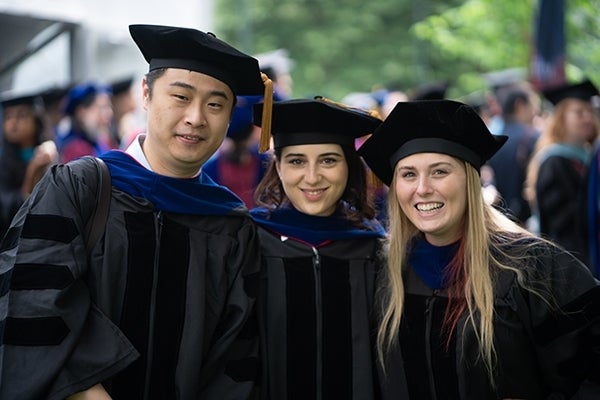
Our Ph.D. program allows students to tailor a curriculum to suit their specific interests, and provides them the financial resources to launch their academic career.
In addition to a full tuition waiver, our students currently receive an annual stipend as well as a budget for research and travel and health insurance for all five years.
Annenberg is the smallest of the 12 schools at Penn, and it functions as close-knit community of scholars whose doors are always open to one another. Our students also appreciate our staff , who routinely go above and beyond to support them.
Please note that we do not have a standalone master’s degree program at this time. All students are admitted directly into the doctoral program.
Request for More Information
Our Students By the Numbers
Here are some fast facts about our students and the admissions process . Get to know Annenberg!
Students currently in the program
Different nationalities represented by our students, applicants each year, students accepted each year, average undergraduate gpa of applicants, average toefl of admitted candidates, of students came from a previous graduate degree program, of students worked in a career before joining annenberg, of students came straight to annenberg from an undergraduate degree.
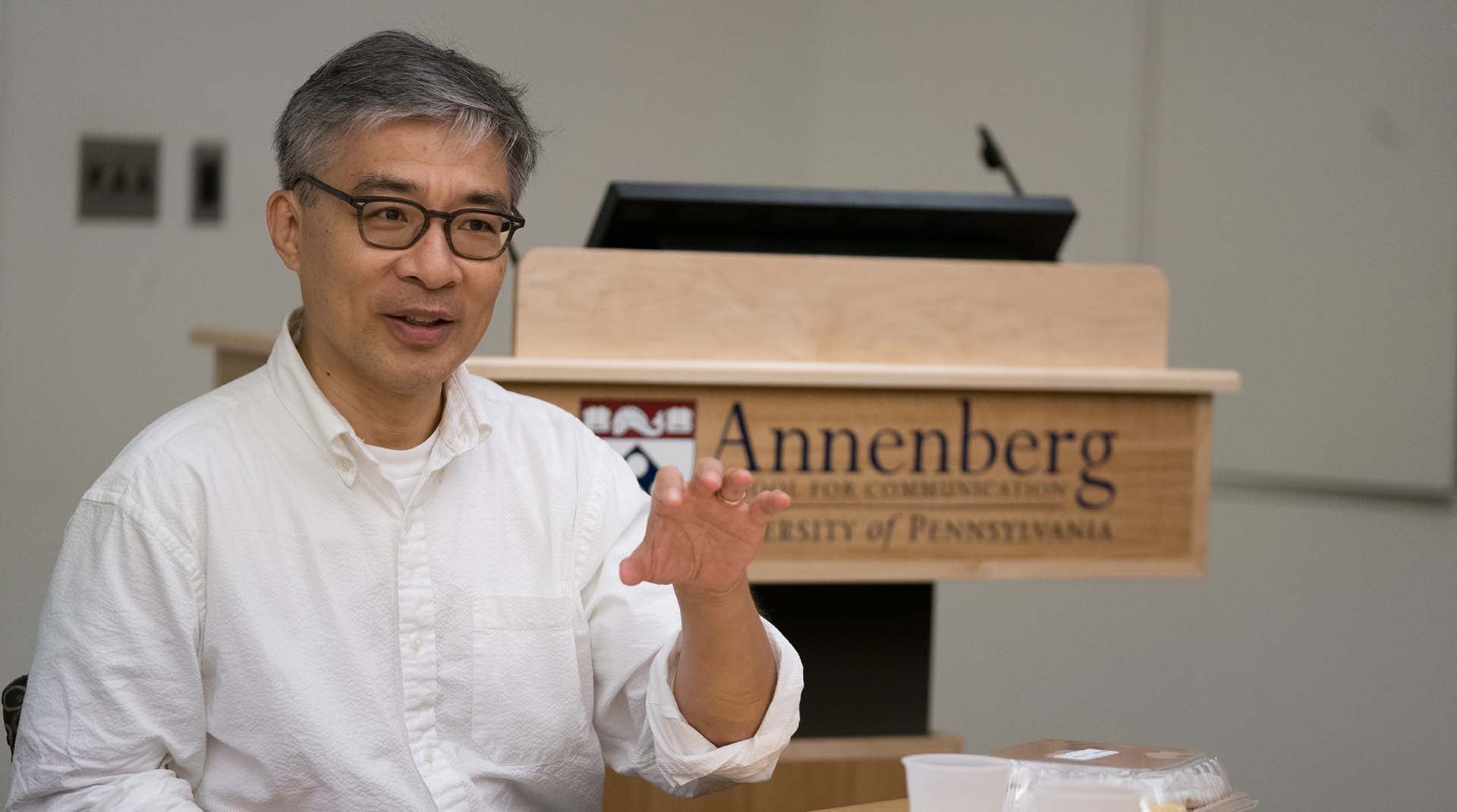
Our Faculty
Our graduate faculty is at the heart of the school. Their innovative work, often in collaboration with students, pushes the field of Communication forward.
Students on Video
Hear from some of the Annenberg School's doctoral students as they talk about their work and what brought them to Annenberg.
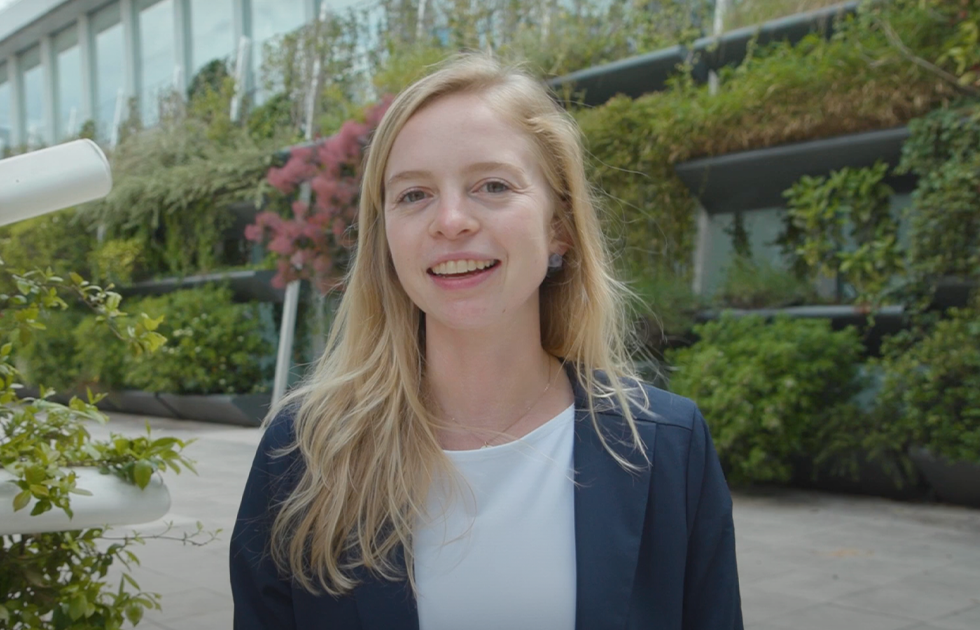
What is it like to be a doctoral student at the International Communication Association annual conference? We followed four students to find out.
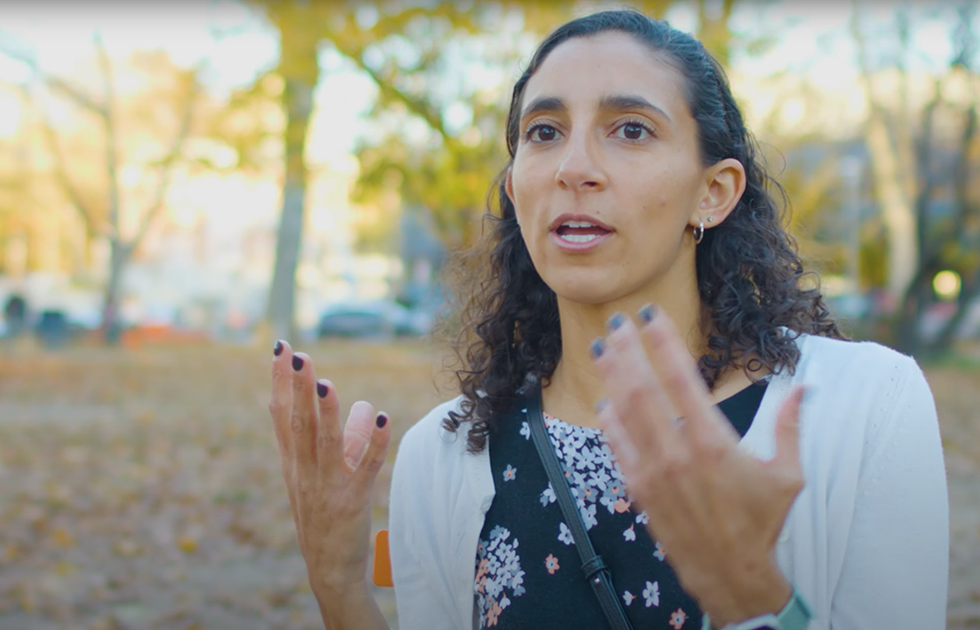
During the early days of the COVID-19 pandemic, doctoral candidate Kelly Diaz used her phone to document the many signs displayed in yards and windows around her West Philadelphia home. She has now collected that body of work into a photo essay .
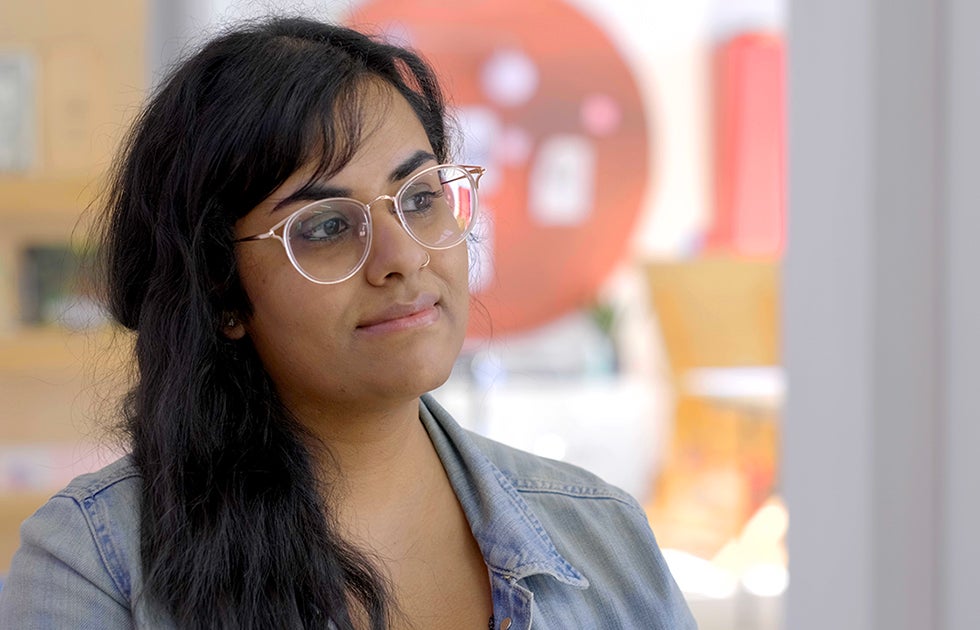
Doctoral Candidate and artist Roopa Vasudevan studies the ways that the everyday technologies shape our daily lives.
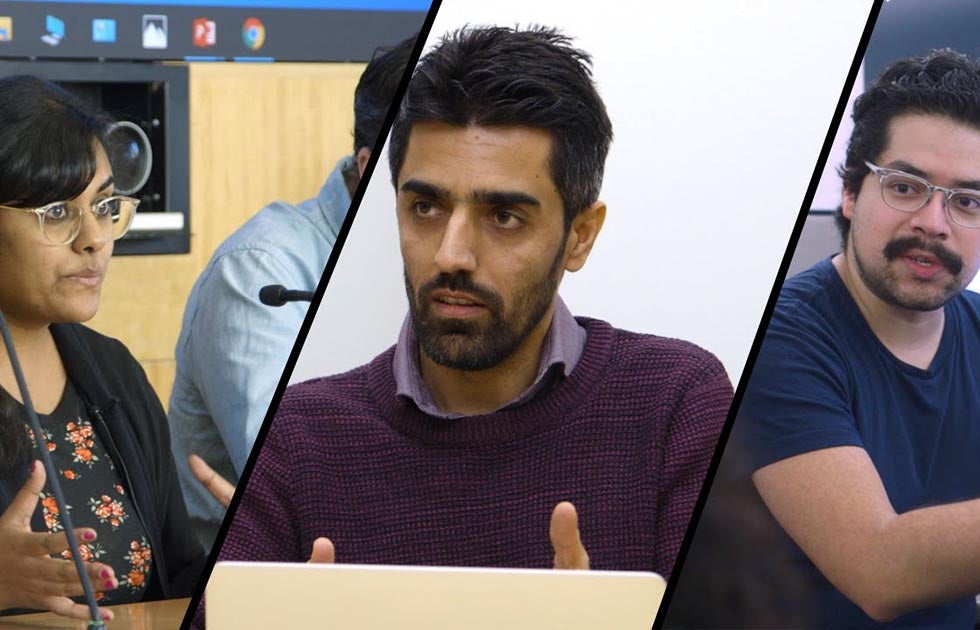
What is it like to be a Ph.D. student? We followed five of our students through their daily activities.
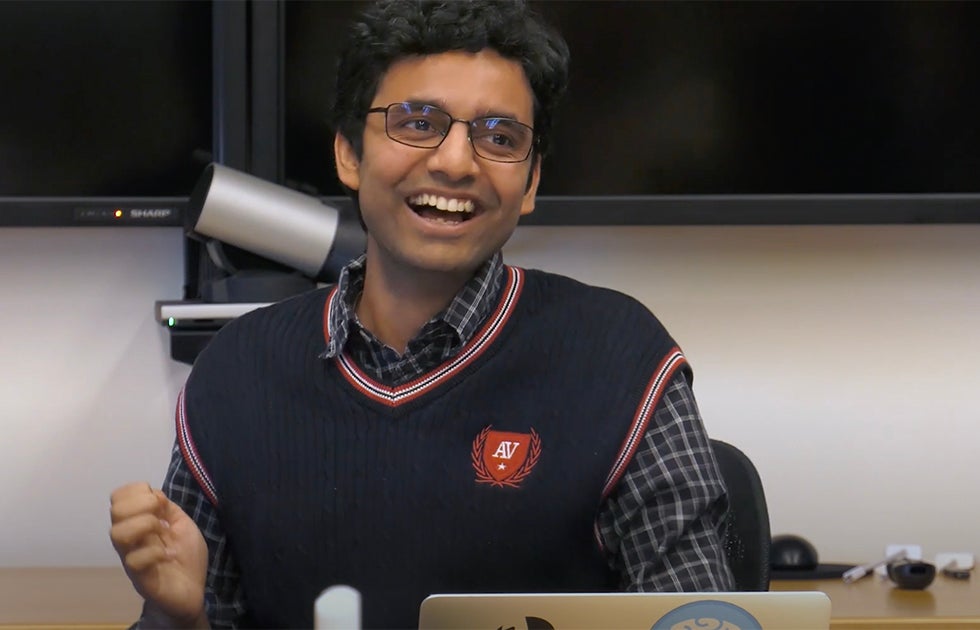
Prateekshit Pandey works with the Communication Neuroscience Lab to study how the brain reacts to humor.
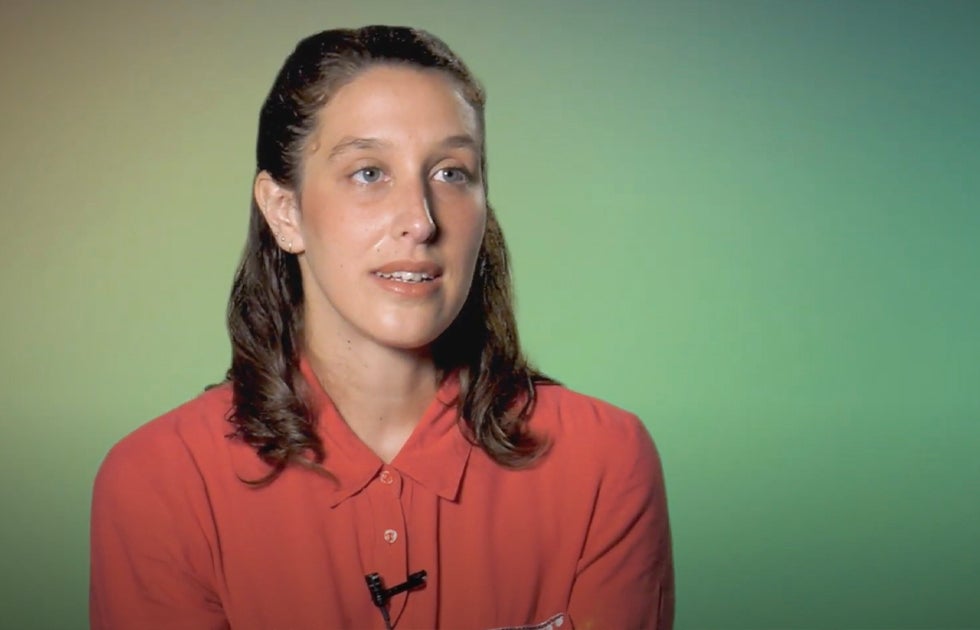
Buenos Aires-native María Celeste Wagner looks at how gender influences credibility in news.
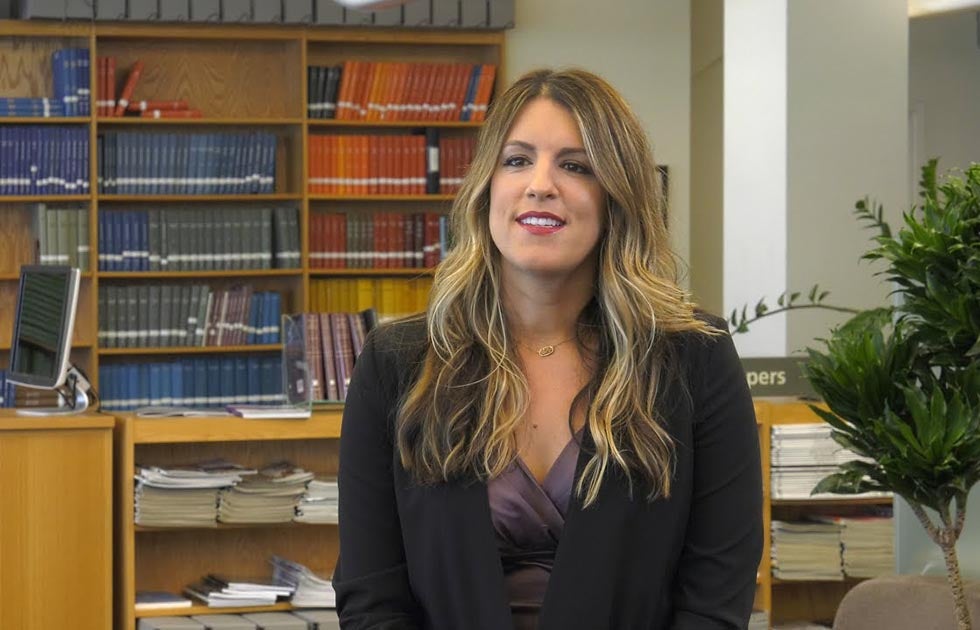
Jennifer Henrichsen studies the way that journalists adopt information security technologies to protect themselves and their sources.
Our Students
Annenberg's doctoral students represent a broad spectrum of interests, methodologies, and backgrounds. Here are just a few of our incredible students.
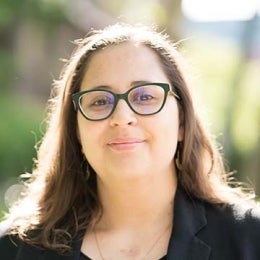
Arlene C. Fernández
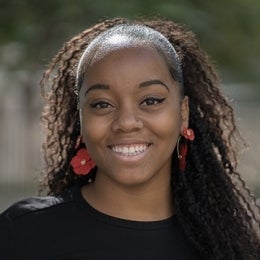
Azsaneé Truss
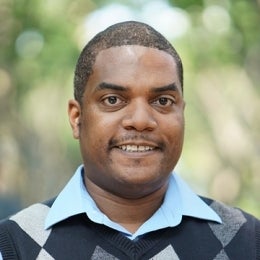
Antoine Haywood
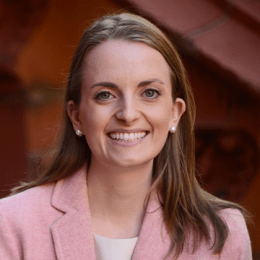
Danielle Clark
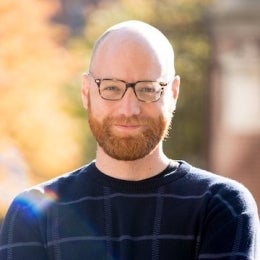
Neil Fasching
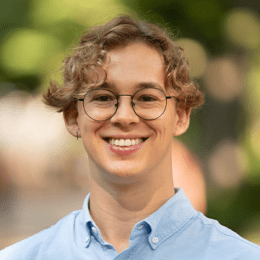
Tom W. Etienne
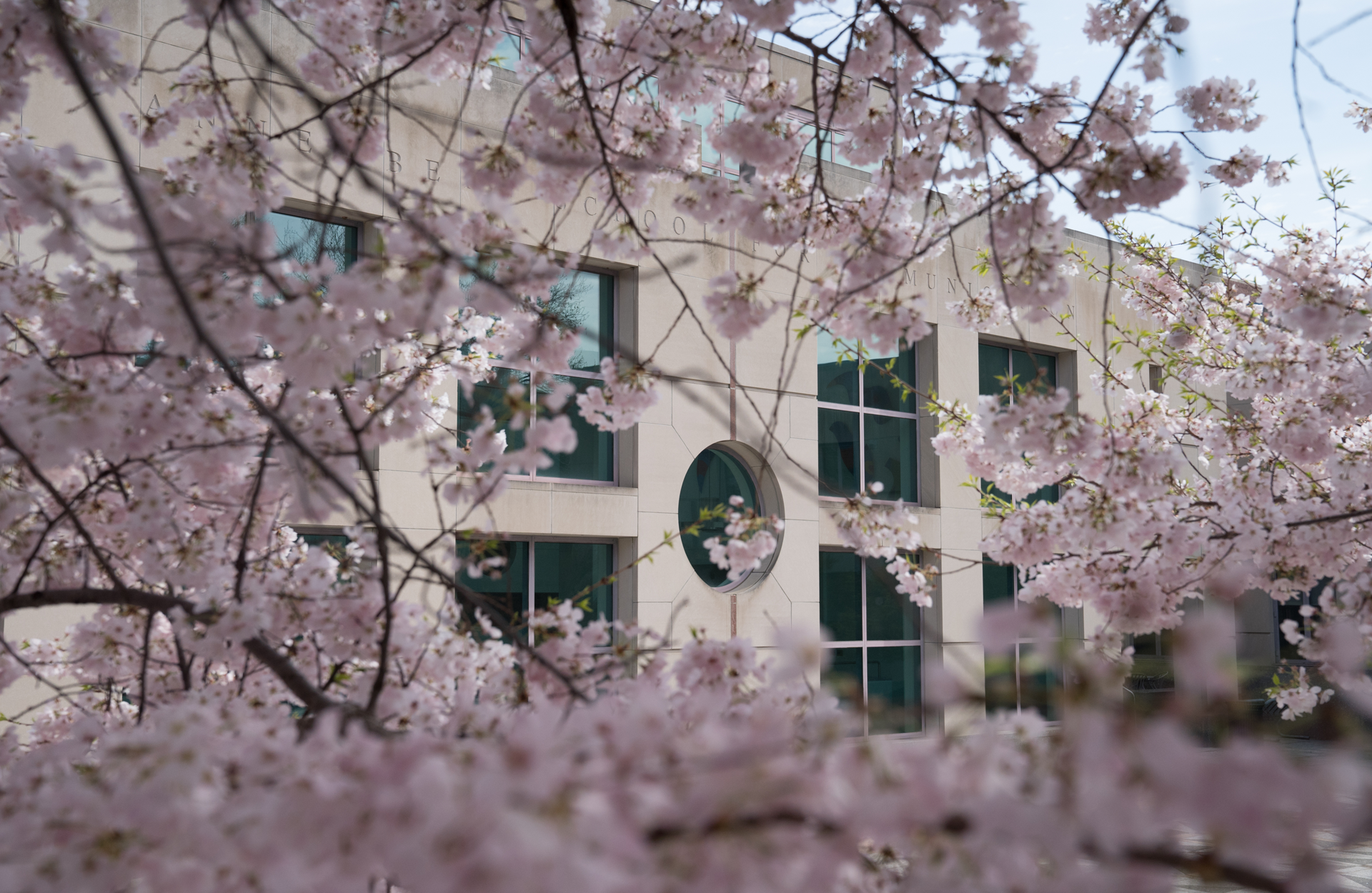
Proust, Smith, and Truss Win 2024 James D. Woods Award
The award recognizes Annenberg graduate students for outstanding teaching.

Azsaneé Truss Receives Penn Prize for Excellence in Teaching
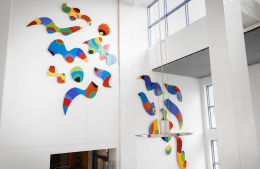
Three Annenberg Doctoral Candidates Awarded 2024 Sachs Program Grants
Kallahan brown named 2023 presidential ph.d. fellow.
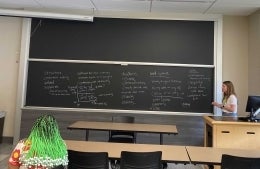

Doctoral Students Collaborate With Philadelphia High School Students on Health Communication Research

Explore the Program
Learn more about life in the Annenberg Ph.D. program.

Financial Support
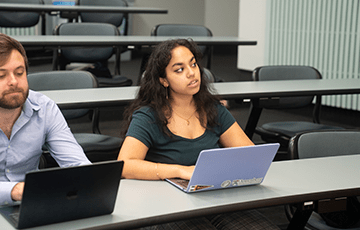
Curriculum & Milestones

Student Life

Applications for 2025-2026 will open by October
More in doctorate in communication.
- Undergraduate Majors & Minors
- Academic Calendars
- Graduate Degrees & Certificates
- Academic Requirements
- Online & Distance Education
- Academic Support
- Transfer Degrees
- Academic Opportunities
- Accelerated Options
- Accreditation
- Colleges, Schools & Departments
- Undergraduate
- Prospective Parents & Families
- Contact Your Representative
- International
- Request Information
- Visit Campus
- Veteran & Military
- Cost of Attendance
- Financial Aid
- Payment Options
- Scholarships
- Payment Dates
- Net Price Calculator
- Tuition & Fees
- Diversity, Equity & Inclusion
- Learning Communities
- Organizations & Activities
- Fargo-Moorhead Area
- Student Services
- Health & Wellness
- Safety & Security
- Basic Need Resources
- Club Sports
- Dragon Athletics
- Intramurals
- Community Engagement
- Parents & Family
- Campus Visit
- MSUM Foundation
- Maps & Parking
- Accreditation & Compliance
- Our History & Traditions
- College Profile
- Center for Engaged Learning
- Policies & Procedures
- University Leadership
- Mission, Vision & Values
- Strategic Priorities
- Student Achievement Information
- Meet Our President

School of Communication & Journalism
Communication and Journalism are exciting, dynamic and fast-moving fields of study. From the morning newspaper to online publications, personal presentations, advertising and public relations messages, tweets, and blogs to the nightly news broadcast, communicating is an integral part of our everyday lives. The School of Communication & Journalism offers a variety of majors each balancing the breadth of a liberal arts curriculum with the depth of a professional career curriculum. Students acquire career communication skills through traditional in-classroom learning and hands-on experiential projects.
See all the School of Communication & Journalism degree options
MSUM School of Communication & Journalism students learn by doing, not just from textbook theories and case studies. Students gain relevant, hands-on experience outside the classroom through a multitude of collegiate competitions, student organizations and internship opportunities. This hands-on approach allows students to graduate with a strong, diverse portfolio and samples of real-world work that are sure to impress future employers.
Our faculty have years of experience working in the media profession prior to teaching, and are eager to share their firsthand experience with students. Nationally recognized, practicing professionals also teach a number of courses and provide students with incredible connections in the industry.
MSUM School of Communication & Journalism students consistently produce award-winning television broadcasts, newspaper articles, advertising and public relations campaigns, blogs, photographs, documentaries and more. Employers are familiar with the regional and national contests, and recognize the skill and dedication it takes to win—which our students frequently do.
The Marcil Center for Innovative Journalism, housed in the School of Communication & Journalism, gives students the opportunity for scholarships, apprenticeships and enrichment programs, including conferences and professional collaboration.
- Campus News Named Best College News Magazine by SPJ, Wins 1st Place in Eric Sevareid Awards, Crystal Pillar in Student NATAS Awards MSU Moorhead’s Campus News newscast has been honored by three different journalism organizations. The Society of Professional Journalists named Campus News as the winner in the student news magazine category in its annual Mark of Excellence Region 6 Awards. The Society of Professional Journalists (SPJ) Mark of Excellence Awards for Region 6 includes colleges and universities in the states of […] Learn More
- Broadcast Journalism Student Honored with Prestigious NATAS Scholarship Broadcast Journalism student Christopher Hovden was recently announced as the 2024 Bob Fransen Leadership Scholarship recipient by the National Academy of Television Arts and Sciences (NATAS) Upper Midwest Foundation. Hovden was recognized for his work as a co-anchor, producer, reporter, photographer, and writer on the university’s Campus News program. Hovden also recently produced and premiered a full length documentary, The […] Learn More
- MSUM Broadcast Documentary class premieres “The Pioneer Barber” Feb. 8 The documentary is the culmination of the work of more than a dozen students in the Fall 2023 Broadcast Documentary class. Learn More
- Denise Gorsline among 36 higher education leaders chosen for AASCU’s Department Chair Institute The American Association of State Colleges and Universities (AASCU) has selected 36 higher education professionals for the inaugural cohort of its Department Chair Leadership Institute (DCLI), a program designed to address the unique needs of department chairs at state colleges and universities. Among the inaugural members is Minnesota State University Moorhead Professor Denise Gorsline, chair of the School of Communication […] Learn More
- MSUM senior receives scholarship to PRSSA ICON 2023 MSUM senior and Pelican Rapids, Minn., native Katlyn Haugrud has received a scholarship to attend the PRSSA ICON 2023 international conference Oct. 12-17 in Nashville, Tenn. Katlyn, the daughter of Bonnie Haugrud and the late Keith Haugrud, is an integrated advertising and public relations major and the president of MSUM’s Michelle (Foulk) Olson, APR, Chapter of PRSSA. Olson is a managing partner, Aerospace/Defense and […] Learn More
Texas Tech Now
Media and communication graduate earns degree after decade-long journey.
May 10, 2024
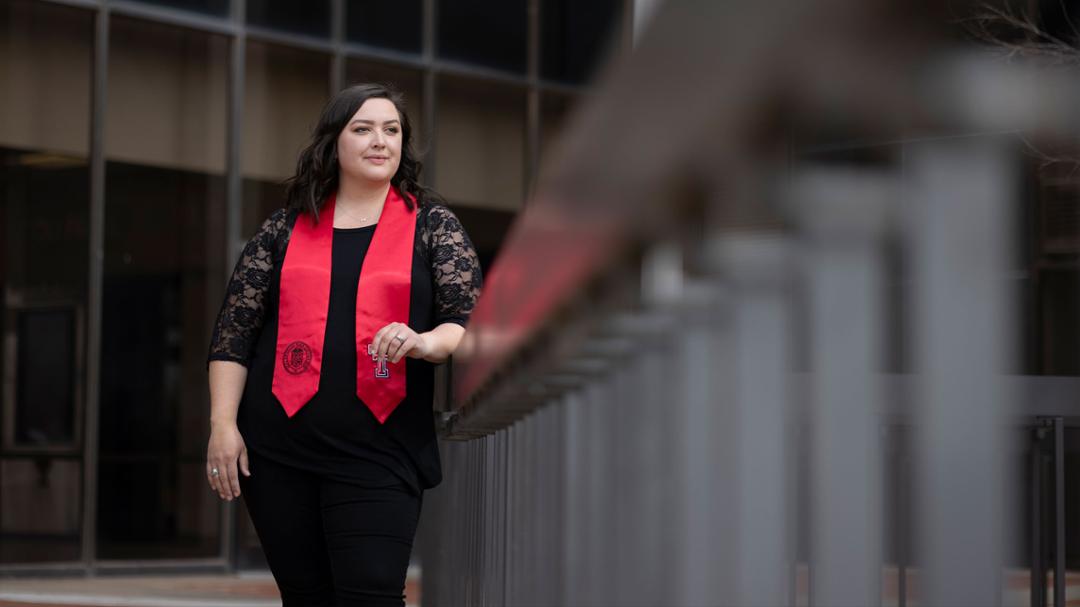
Gini Wilbanks proves you can have it all, just not all at once.
Gini woke up, her heart mimicking the pulsing beat of her alarm.
It was another morning of a racing heart and a sick feeling in her stomach. She wondered if her family had made the right decision moving to Round Rock, Texas. She made her way to Elijah's crib, picking up her 6-month-old who was crying. She wanted to join him, but she was too exhausted to cry.
Gini and her husband Josh had moved from Lubbock so Josh could take a job near Austin. He had recently graduated from Texas Tech University, but Gini still had roughly 40 credit hours to finish. The move away from campus meant a change in major for Gini. The former Creative Media Industries student switched to Public Relations & Strategic Communication Management.
She was getting close to finishing her degree, but on this morning, the finish line felt far. Gini started making breakfast for herself and her two older children, Adeline and Charlotte.
“I was postpartum, and I got hit hard with depression and high anxiety,” Gini recalled. “My grades started to suffer.”
Gini had moved away from her family, friends and her entire support system. The couple had believed the move would set them up for a successful future but at this moment, Gini couldn't think past the next few hours.
A Future Red Raider
“Texas Tech has always been a huge part of my life,” Gini said.
Born and raised in Lubbock, Gini's parents both worked at the university. The family was active in their support of Red Raider athletics and the university's arts scene. They attended each Carol of Lights™ and befriended faculty and staff around campus.

Growing up in the college town inspired Gini to attend Texas Tech one day.
Coming up through Tubbs Elementary, O.L. Slaton Middle School and Lubbock High School, Gini was active in theater, dance and choir. She involved herself in as many artistic events as she could, finding these endeavors energized her.
As high school graduation approached, though, she took stock of what would offer a consistent career.
“When I graduated in 2013, there were not as many jobs in communications,” Gini said. “There was a stigma around creative careers. I wanted to be seen as serious so I looked for something that would make good money.”
Multiple family members worked in the medical field, so Gini decided to study nursing.
Around this same time, she and her high school sweetheart were getting more serious. Gini met her now-husband Josh in biology during the ninth grade. The two became friends and started dating the following year. By the time they graduated, they both knew they'd found the one.
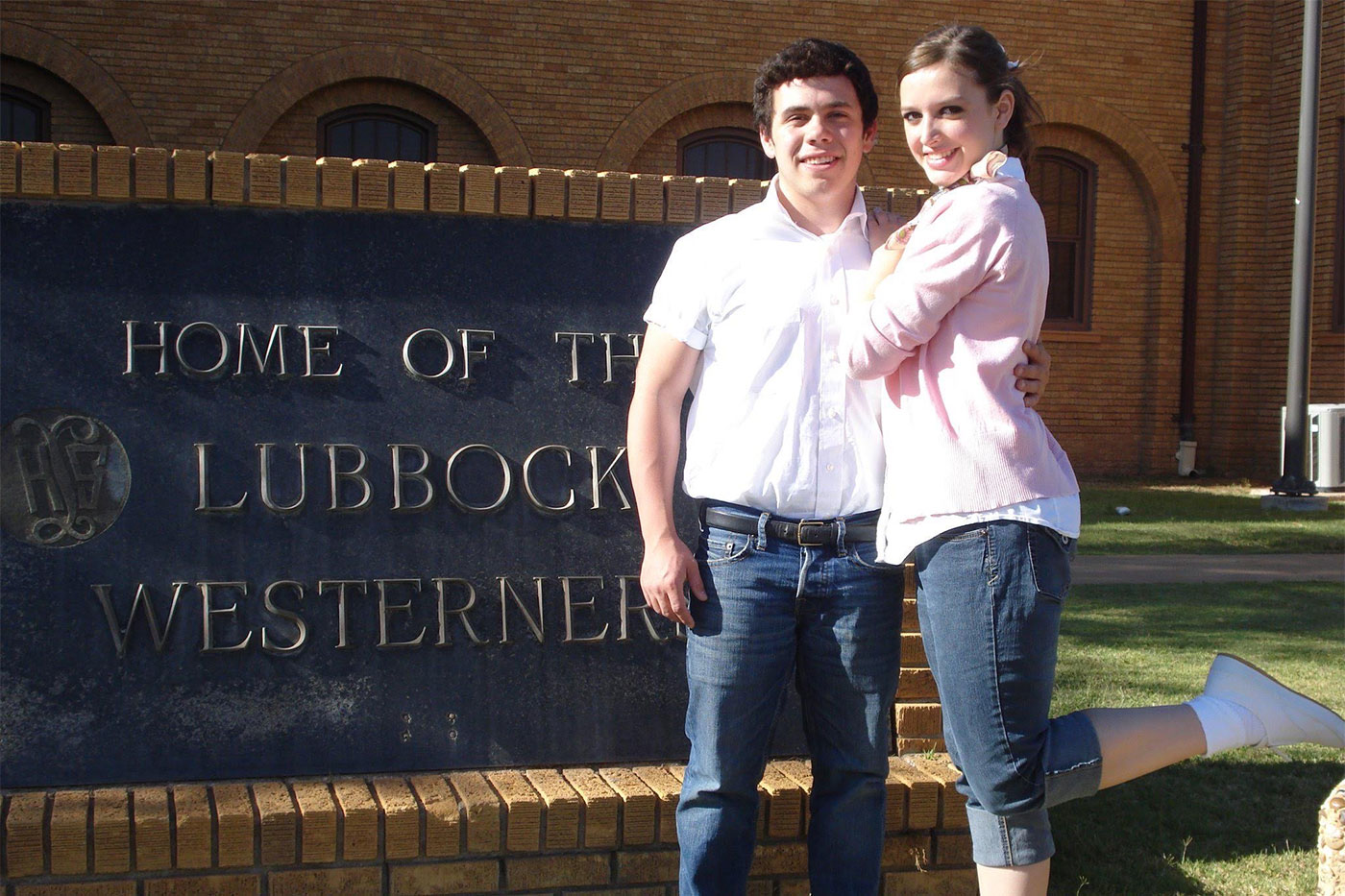
Josh enlisted in the Army and was sent to basic training the summer after graduation. The young couple couldn't talk much on the phone, so they wrote letters throughout the long, sweltering summer months. Gini would make her way to the mailbox in the dry West Texas heat, opening the latch to find something stamped from Fort Benning.
The couple kept every letter from that summer.
Meanwhile, Gini started pre-nursing courses at South Plains College (SPC). While the dream was still to attend Texas Tech, she knew she could get basic requirements out of the way at a lower cost at SPC.
“For a few semesters, I was very focused on my schoolwork,” Gini recalled. “Josh was getting his stuff done and I was taking care of my classes.”
In the following years, everything rapidly changed. In April 2016, the couple got married and Gini started work as a nurse's aide at Covenant Children's in the postpartum unit.
In 2017, the couple welcomed their first child, Adeline. By 2018, Josh enrolled full time at Texas Tech.

In the span of a few short years, Gini's life looked drastically different.
“When we had Adeline, I ended up having an emergency cesarian,” Gini said. “Because of the longer recovery, I ended up taking that whole semester off from school.”
Gini's classwork began to take a backseat during this time. Supporting Josh in his studies, working as a postpartum nurse's aide and taking care of a newborn was a full load.
“I decided to take a prolonged break from school,” she said. “I had a job I enjoyed and wanted to soak up being a new mom.”
While a break was the right choice for Gini at that time, it made going back to school that much tougher.
A Change in Direction
Josh and Gini had their second daughter, Charlotte, at the beginning of 2020. She was only a few weeks old when the pandemic started. Josh, Gini and their young children were home for months. While Gini did go back to work after her maternity leave was over, the restrictions gave her room to reflect.
“We were stuck at home for a while, and my need to express myself creatively came back out,” she said.
It was something she hadn't taken the time to do in years.
Gini came up with crafts to do with their eldest, and she started dabbling in photography. A light came on, and Gini started questioning the academic road she'd taken up until that point.
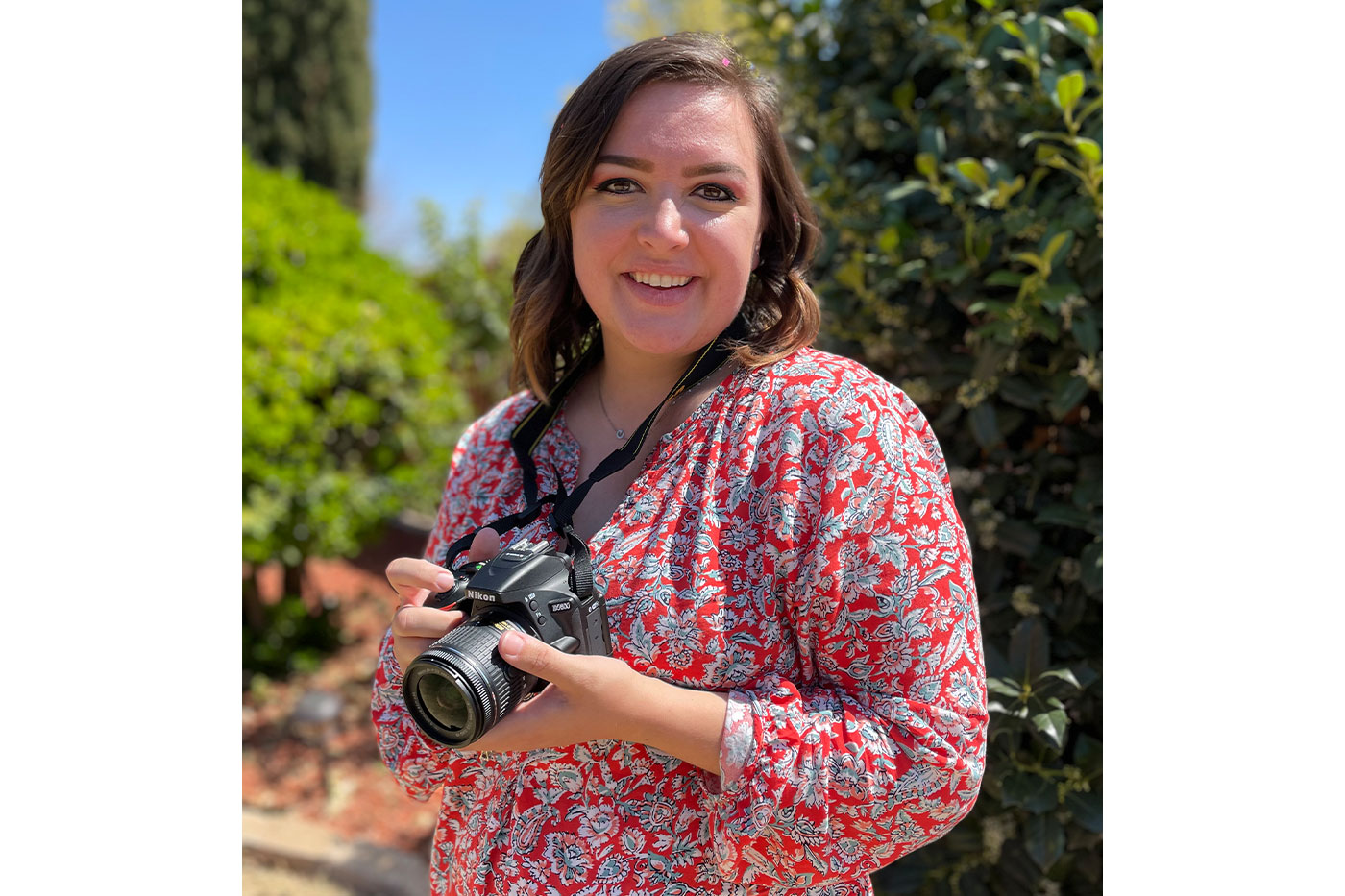
“The stress of working through the pandemic certainly added to it, but I think the pandemic showed me something I already knew deep down,” she said.
Gini had chosen to forego a creative career seven years prior, worried about appearances and stability. Now, a wife and mother, her priorities had changed.
“I'd grown up a lot in that short time, and I had different aspirations,” she said.
Not only had Gini changed, but the communications industry had changed as well. When she graduated from high school, some organizations were just beginning to use social media, and many weren't utilizing it at all. But with the progression of technology and the sudden boom of online activity during the pandemic, Gini decided to revisit a career in communications.
She met with Associate Director of Advising Don Ellis in the College of Media & Communication (CoMC), who became a mentor to Gini every step of the way.
“Gini came to us as a transfer student, and she had a level of maturity and diverse life experiences that seemed to enhance the quality of her academic career,” Ellis said. “Despite challenges posed by the pandemic, she consistently displayed a strong sense of determination and resilience, maintained her focus, and always actively participated in her own education.”
Gini had always wanted to help people; she thought nursing was the best way to do that. But as life changed, she realized she could make a difference while using her talents.
“I discovered Texas Tech had a program called creative media industries (CMI),” she said.
The program's focus on innovative storytelling was appealing to Gini, who was looking to grow her existing passion for visual communications. So, in the fall of 2020, Gini started her first semester as a Red Raider.
The moment was a long time coming.
While her first semester was completely online, Gini was able to be on campus in the spring of 2021.
“I have a photo of my first day on campus,” she said. “I have a mask on, so it'll always be easy to remember when that was.”
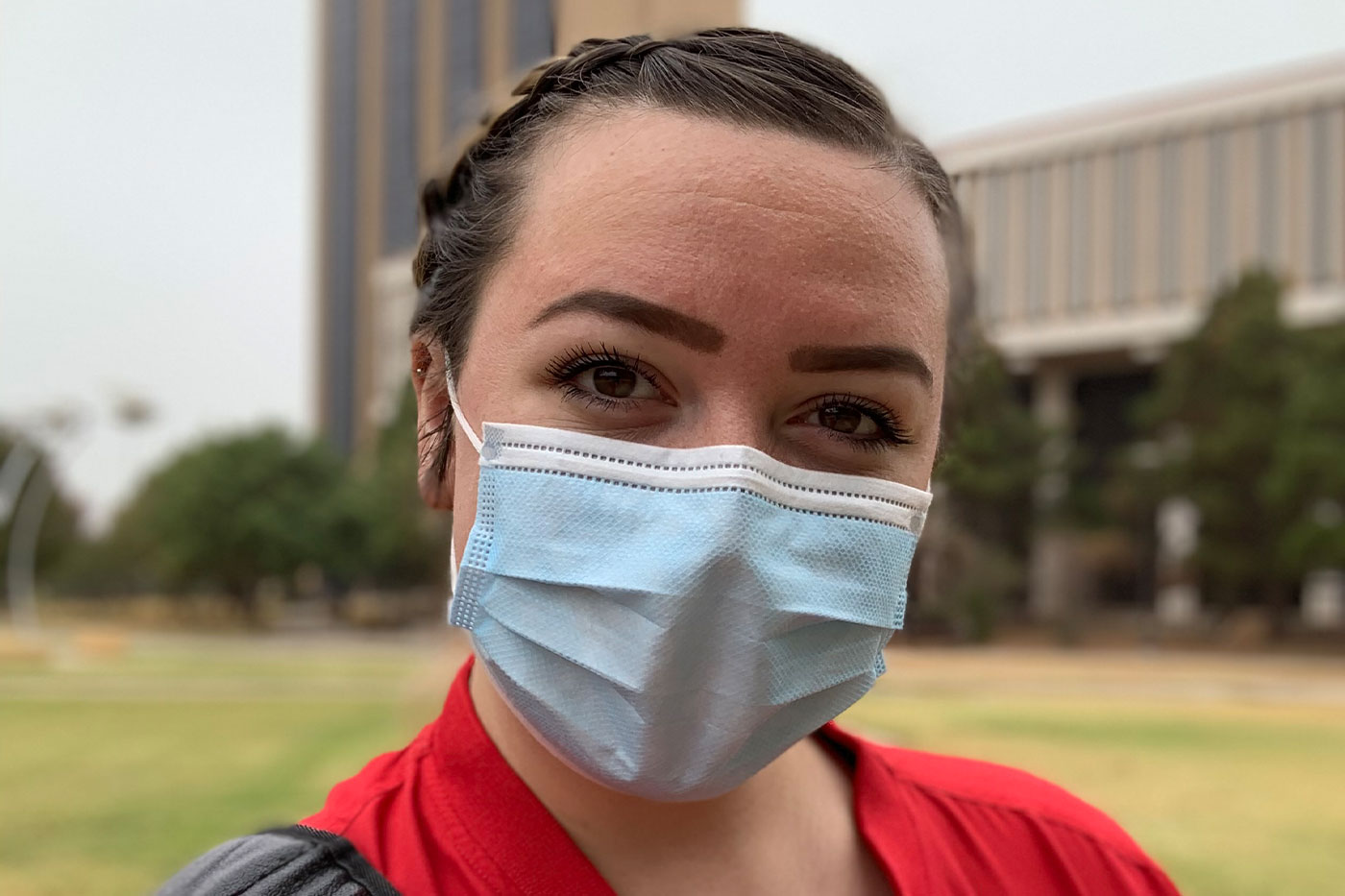
Life had thrown her some curve balls, but Gini was zeroing in on what she wanted and remembering the dreams she had had as a young girl. She knew she would attend Texas Tech, the reality of that was just a whole lot different than she envisioned.
For the following year, both Josh and Gini were enrolled in the same college. Josh was a student in the Public Relations & Strategic Communication Management program, while Gini thrived in CMI. It was around this same time that the couple found out they were expecting another child, a son.
“I remember thinking, ‘Oh boy, here we go again,'” Gini laughed.
Thrilled to be welcoming a son, Gini struggled, wanting to focus on her growing family and her schoolwork at the same time. When she had her daughters, she was in a love-hate relationship with academia. That had changed this time around. She wondered how she would balance being a mom to three kids while finishing a program she genuinely loved.
It was a good problem to have, but it remained a problem. To make matters harder, Josh received a job offer in Round Rock after graduating from Texas Tech in the spring of 2022, only a few months after they had Elijah.
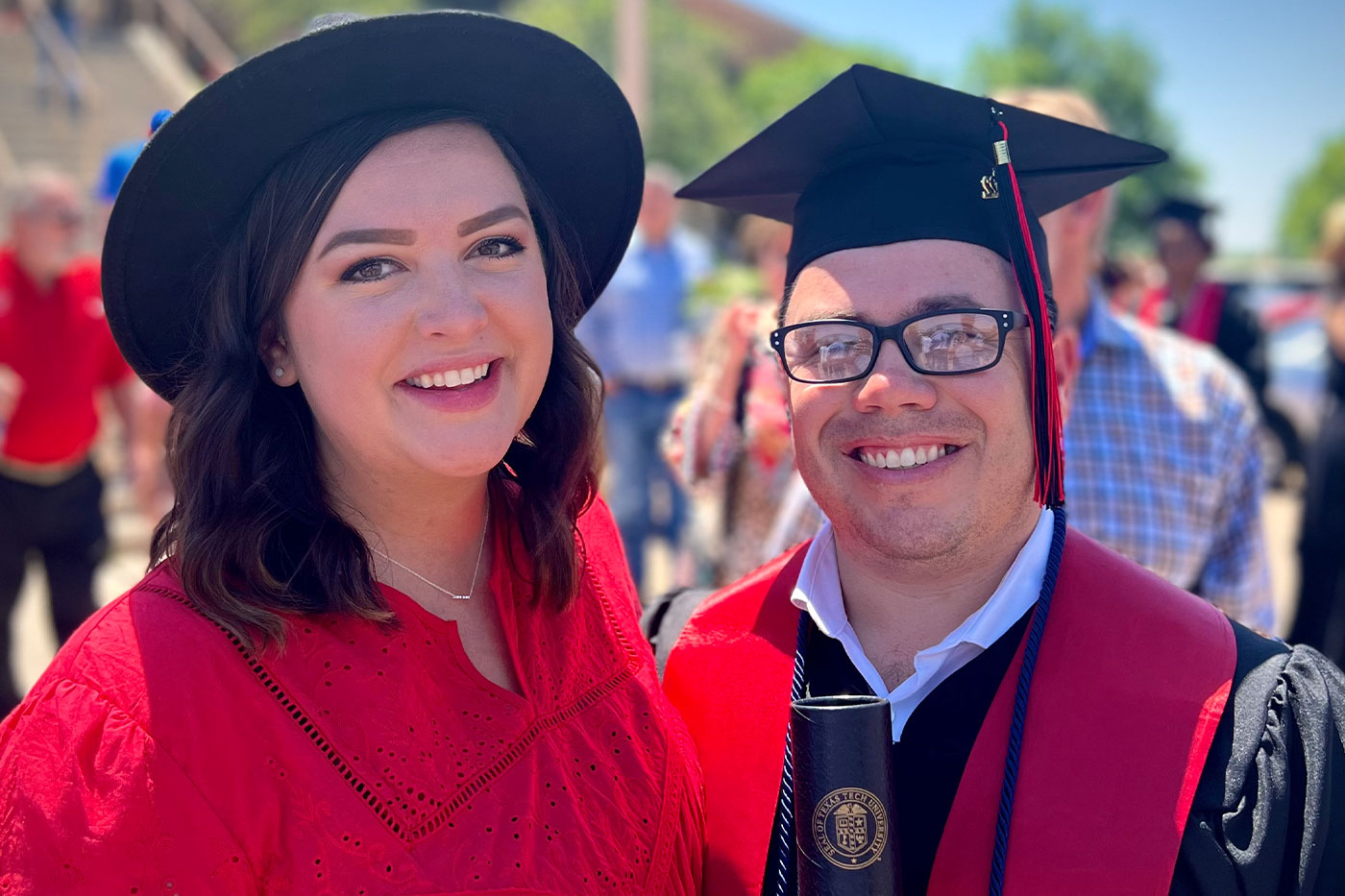
Josh was commissioned as an Army officer upon graduation and signed with the National Guard. His new reporting station was in central Texas and a marketing job became available nearby. However, that meant Gini and the kids would have to leave behind their support system in Lubbock. Both Gini's parents still lived in Lubbock, and she had friends in her hometown.
Unfortunately for the couple, they didn't have a lot of time to weigh their options. They wanted Josh to start work in six weeks. So, with three young children and virtually no community in Round Rock, Josh and Gini ventured into the unknown.
The Hardest Stretch
In the early morning hours, a few months later, Gini was at rock bottom. When classes started in fall of 2023, she had to go back to being an online student. Unfortunately, CMI was not a fully online program. But with the encouragement of her adviser, Gini realized the Public Relations & Strategic Communication Management program overlapped heavily with the courses she'd taken, and it was offered both in-person and online.
If she was going to complete her degree any time soon, she'd need to switch programs.
So, she did, and the coursework was comparable to what she'd been studying. However, it wasn't the change in major that was so difficult, it was the fact she was an online college student with three children, at home alone, and suddenly without her support system.
She also struggled with postpartum depression after the birth of her son.
“Honestly, I felt like finishing school just wasn't going to happen for me,” Gini said. “Like, maybe it wasn't in the cards.
“I was taking care of a five-month-old, a toddler, and a 5-year-old. I had no family or friends nearby and I was waking up every morning with a high heart rate, sick to my stomach. I stressed over finances, wondering if we'd made a mistake.”
During that semester, Gini's grades began to suffer. She knew that wasn't the way she wanted to finish her college career, so she sought help from her doctor and her adviser. Everyone worked with her, finding solutions to help her succeed.
Her doctor placed her on an anti-anxiety medication that helped her feel like herself again. Gini begin to create a new routine and even befriended other mothers in the area.
“I also made sure to reach out to my adviser and kept the line of communication open with each of my professors, letting them know my situation from the beginning,” she said.
By the end of the semester, she made the President's Honors List.
There were times, particularly that semester, that Gini was tempted to give up.
“Every time I was about ready to give up, I would think, ‘C'mon Gini, you have to do this for yourself. You've always wanted to be a Texas Tech graduate; you can do this.'”
In place of having family in town, Gini would get on the phone and get added support when she needed it most.
Gini's mother was her biggest cheerleader.
“She has watched me work toward this goal for a decade,” Gini said. “She's always been so encouraging. Whenever I've had a setback, she reminds me to get back up and get at it. She's always believed I can do this.”
And on the days when Gini didn't believe in herself, her family, her friends, and Josh have been there to help her cross the finish line.
“Both Gini and I were unique students,” Josh said. “Texas Tech does an amazing job catering to individuals who are in nontraditional situations.
“Gini has displayed such tenacity while finishing her degree, especially this past year. She doesn't let anything define or limit her. At no point has she looked at her circumstances and let them be a reason not to do something.”
The Horizon
After graduation, Gini hopes to work in public relations as a social media manager; particularly for brands geared toward mothers and children.
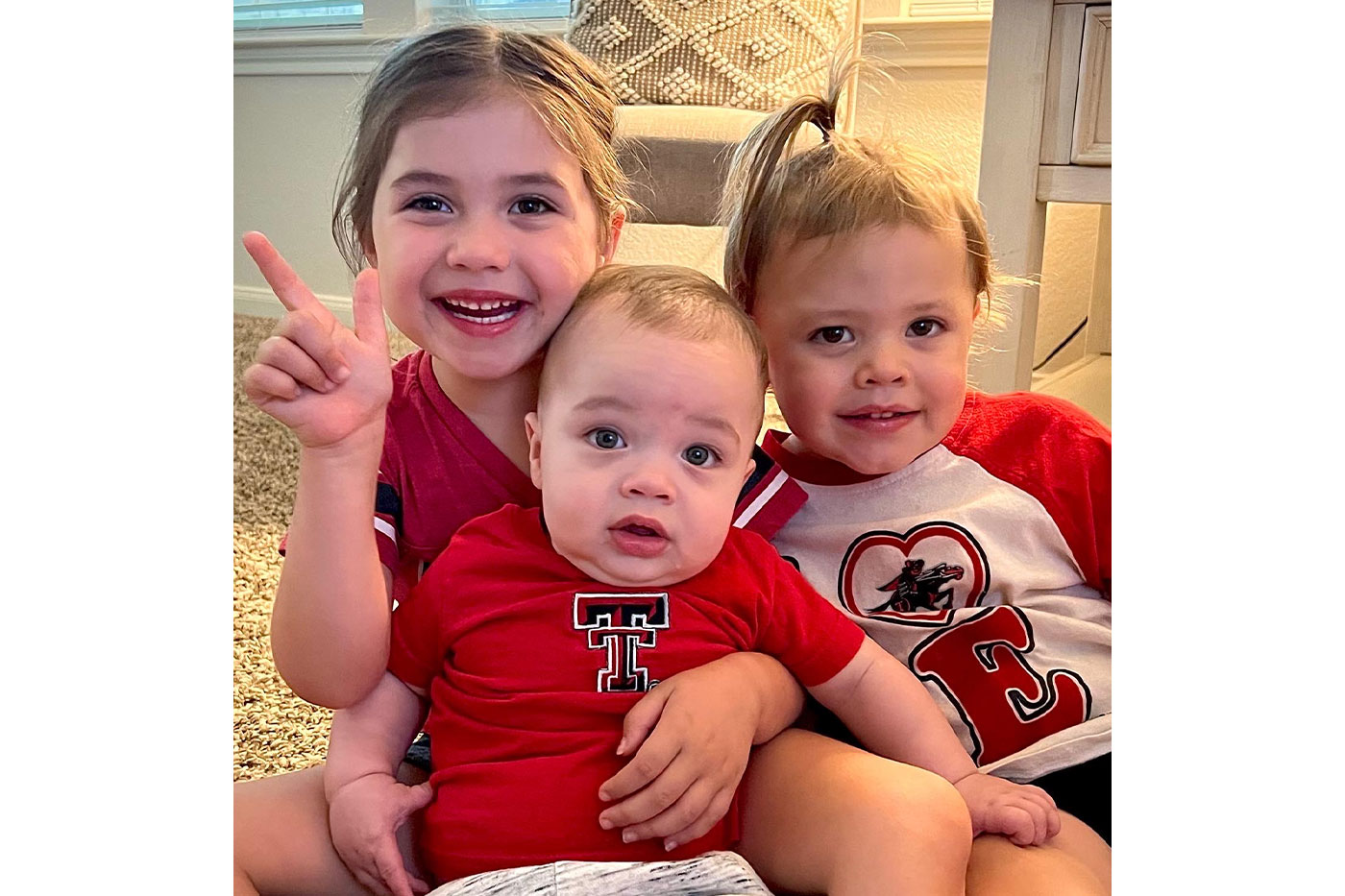
As proud as Gini is of finishing her degree, she is even prouder of being a mom. She wants to share that passion in an industry that has plenty of need for good public relations practitioners.
“In my experience, juggling the demands of being a fulltime public relations major and a mother of three, I've come to realize the critical importance of authenticity and connection,” she said. “Especially when it comes to brands marketing to mothers.”
The demographic Gini hopes to appeal to is focused on quality and safety, just as she is. Gini has found that parents do not just want to buy products, they want guidance and support. That's why it's important for a public relations campaign to educate and engage that demographic, she says.
Gini does not hide the fact she is a non-traditional student. Rather, she plays to her strengths.
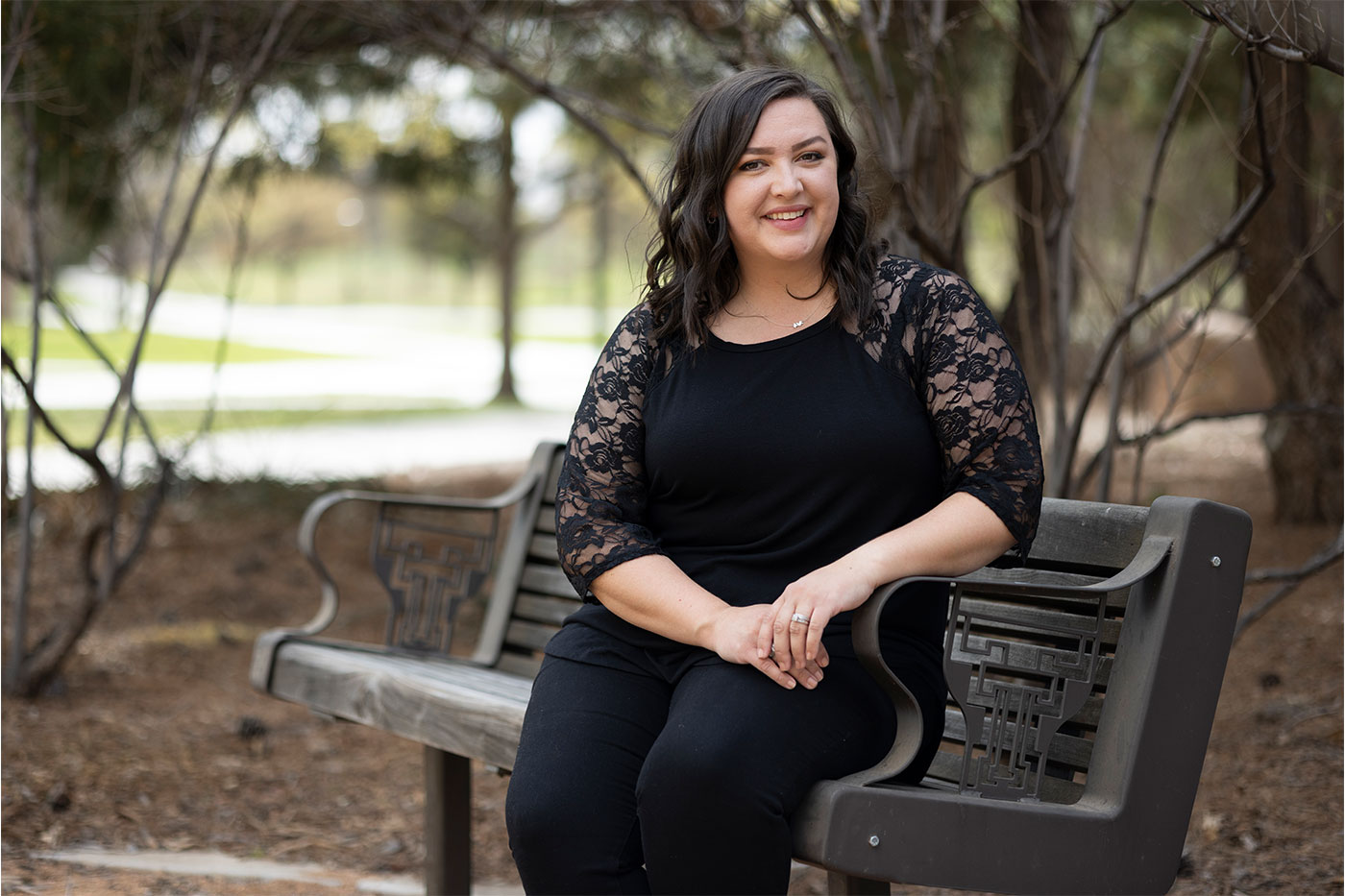
“As a mom entering the PR world, I bring a unique perspective to the table,” she said. “I know firsthand the challenges and joys of parenting, and I believe our experience as mothers enriches the work we do.
“By sharing our stories and collaborating with influencers who share our values, we can create genuine connection with audiences.”
Gini has been in a campaign course this semester, which serves as a capstone for her degree program. To her delight, most of her team members also turned out to be parents. While she may have started out on campus as the older student in class, her online experience has partnered her up with colleagues who are on similar paths.
Gini hopes even more parents will consider going back to school and finishing their degrees.
“As fulltime parents and students, it's OK to take your time. School will still be there. The job market will still be there. But time with your kids, that's valuable,” she said.
Even though Gini knows it's not a race, it doesn't make commencement any less sweet. If anything, walking the stage this spring will be that much more special, as it marks her incredible perseverance over the last 11 years.
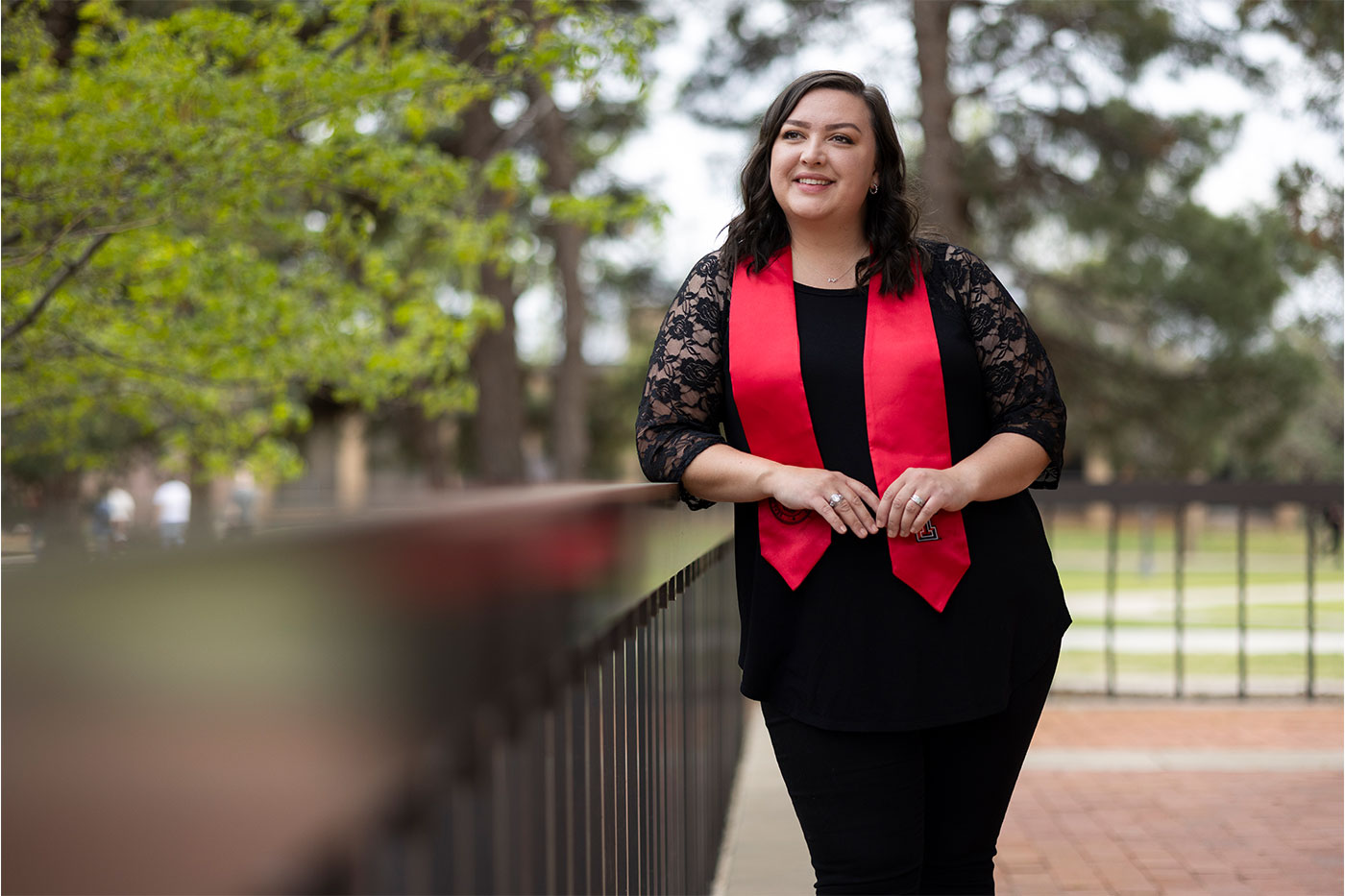
“There have been a lot of ups and downs,” Gini said. “But I can finally see the horizon, and it's a great view.”
You may also like
Brad rogers traveled a demanding path to the nfl, texas tech launches $10k degree completion program, texas tech dfw features $10k degree completion & ios lab.
Join Minitex for Doors Open Minneapolis and tour MLAC's subterranean cavern
Jump to minitex news section:.
Quick Summary
Minitex and the University of Minnesota Libraries are partnering to participate in Doors Open Minneapolis on Saturday and Sunday, May 18-19. From 10:00 a.m. until 5:00 p.m. each day, we'll invite the public into the Minnesota Library Access Center (MLAC) and the Maxine Houghton Wallin Special Collections Research Center.

The Minnesota Library Access Center (MLAC) is a cavernous engineering marvel situated 82 feet beneath Elmer L. Andersen Library, on the West Bank Campus of the University of Minnesota. It is operated by Minitex and functions as a high-density storage facility for Minnesota libraries. MLAC's subterranean 17-foot-tall shelves store more than 1.5 million volumes. Visitors who join us for Doors Open Minneapolis will have the opportunity to descend into the cavern (very safely, in an elevator) and also to visit the above-ground Maxine Houghton Wallin Special Collections Research Center , along with an exhibit space on the main level of Andersen Library.
Also of interest, Hennepin County Library's Minneapolis Central Library is also participating in Doors Open Minneapolis this year. Minneapolis Central Library was designed by world-renowned architect César Pelli. During Doors Open, visitors will be offered self-guided tours of the building, including historical displays on past central libraries in the Special Collections department. On Sunday, the Library will not be open until 12:00 pm.
ABOUT DOORS OPEN MINNEAPOLIS
Doors Open Minneapolis , produced by Rethos, is your chance to explore the buildings that tell our city’s story. From theaters to business hubs, sacred spaces to private clubs, sports complexes to engineering wonders, historical gems to not-even-open-yet buildings, Doors Open Minneapolis will give you a FREE behind-the-scenes look at dozens of exciting venues. Building owners and caretakers will provide unique perspectives that illustrate why these venues, people and businesses, are central to our city’s identity. Learn more on the Doors Open Minneapolis website.
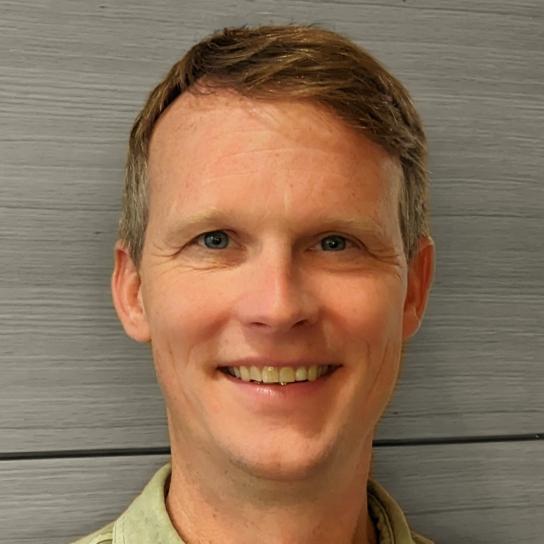
High-density storage for academic, public and governmental libraries
Subscribe to our newsletter
Related articles.
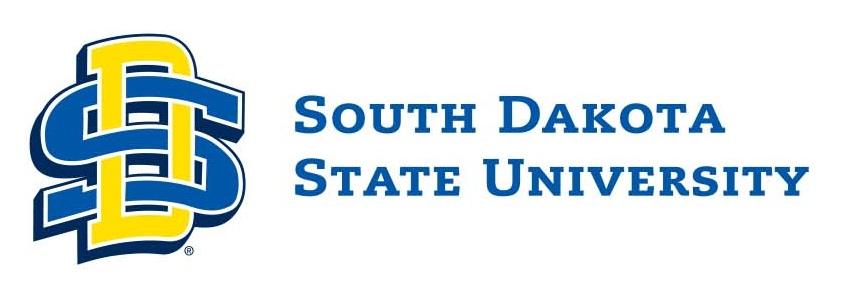
South Dakota State University seeks two Public Service Librarians

So cool: Teen Lit Con 2024
Get the latest Minitex News in your inbox every week
Unauthorized Request
Unauthorized activity detected.
Watch CBS News
Duke University graduates walk out ahead of Jerry Seinfeld's commencement address
Updated on: May 13, 2024 / 2:40 PM EDT / CBS/AP
Dozens of students walked out of Duke University's commencement ceremony on Sunday as actor and comedian Jerry Seinfeld was about to give his address, according to videos posted on social media.
In a video posted on X, people were seen waving Palestinian flags and filing out of the crowd of graduates at the North Carolina university's football stadium.
Duke University President Vincent Price's introduction to Seinfeld was drowned out by some people chanting "free Palestine," while others shouted "Jerry! Jerry!"
The 70-year-old Seinfeld, who has supported Israel since the Oct. 7 attack by Hamas militants, recently sparked controversy over his comments on what remains acceptable fodder for comedy today.
On Sunday, he received an honorary degree from Duke and delivered the commencement address without major interruptions, a livestream of the ceremony showed. The livestream did not show the students walking out.
His speech largely steered clear of politics and instead focused on jokes about the students, artificial intelligence and privilege.
"A lot of you are thinking, 'I can't believe they invited this guy.' Too late," he said, after vowing to "defend" the concept of privilege.
"I say, use your privilege. I grew up a Jewish boy from New York. That is a privilege if you want to be a comedian," he added.
As Seinfeld spoke, the departed graduates chanted, "Disclose, divest, we will not stop, we will not rest" from the parking lot, The New York Times reported.
The actor has not commented publicly on the walkout.
In a statement to CBS News, Frank Tramble, vice president for marketing, communications and public affairs at Duke, said: "We're excited and delighted for the Class of 2024 and their families. We understand the depth of feeling in our community, and as we have all year, we respect the right of everyone at Duke to express their views peacefully, without preventing graduates and their families from celebrating their achievement."
The demonstration by students is the latest manifestation of protests that have roiled U.S. campuses for several weeks as students call for universities to divest from arms suppliers and other companies fueling and profiting from the war.
The protests prompted universities such as Columbia and the University of Southern California to cancel or restructure their main graduation ceremonies.
At the University of Michigan, students briefly interrupted the ceremony earlier this month .
"Peaceful protests like this have taken place at U-M commencement ceremonies for decades," university spokesperson Colleen Mastony said after the ceremony.
This week, Xavier University of Louisiana and the University of Vermont rescinded a commencement invitation to United Nations Ambassador Linda Thomas-Greenfield because of student outcry over the conflict in the Gaza Strip. Administrators at both universities cited pressure from students and the community over the Biden administration's support for Israel in its war with Hamas.
At the University of Wisconsin-Madison, a small group of demonstrators staged what appeared to be a silent protest during commencement at Camp Randall Stadium on Saturday. A photo posted by the Wisconsin State Journal showed about six people walking through the rear of the stadium, with two carrying a Palestinian flag.
Marc Lovicott, a spokesperson for campus police, said the group, which he believed were students because they were wearing caps and gowns, "was kind of guided out but they left on their own." No arrests were made.
Dozens of graduating students at Virginia Commonwealth University walked out on an address by Gov. Glenn Youngkin. While some of the estimated 100 students and family members who left during the Republican governor's speech showed support for Palestinians, others held signs signaling opposition to Youngkin's policies on education, according to WRIC-TV .
At the University of Texas, Austin, a student held up a Palestinian flag during a commencement ceremony and refused to leave the stage briefly before being escorted away by security.
And at the University of California, Berkeley, a small group of pro-Palestinian demonstrators began waving flags and chanting during commencement and were escorted to the back of the stadium, where they were joined by others, according to the San Francisco Chronicle . There were no major counterprotests, but some attendees voiced frustration.
- Jerry Seinfeld
More from CBS News

Delaware student charged with hate crime for vandalizing Holocaust memorial, officials say

North Philadelphia funeral home plans to rebuild after fire, keep family business going

How a Philly native rose from community college to an Obama White House power player

Protesters march to call on banks to divest on Israel's Independence Day in Center City
Yale Program on Climate Change Communication
- About YPCCC
- Yale Climate Connections
- Student Employment
- For The Media
- Past Events
- YPCCC in the News
- Climate Change in the American Mind (CCAM)
Publications
- Climate Opinion Maps
- Climate Opinion Factsheets
- Six Americas Super Short Survey (SASSY)
- Resources for Educators
- All Tools & Interactives
- Partner with YPCCC
Home / Climate Change in the Indian Mind, 2023
Report · May 16, 2024
Climate change in the indian mind, 2023, by anthony leiserowitz , jagadish thaker , marija verner , emily goddard , jennifer carman , seth rosenthal , naga raghuveer modala , mallika talwar , yashwant deshmukh , gaura shukla , jennifer marlon , matthew ballew and matthew goldberg, filed under: behaviors & actions and beliefs & attitudes.
- Report Summary
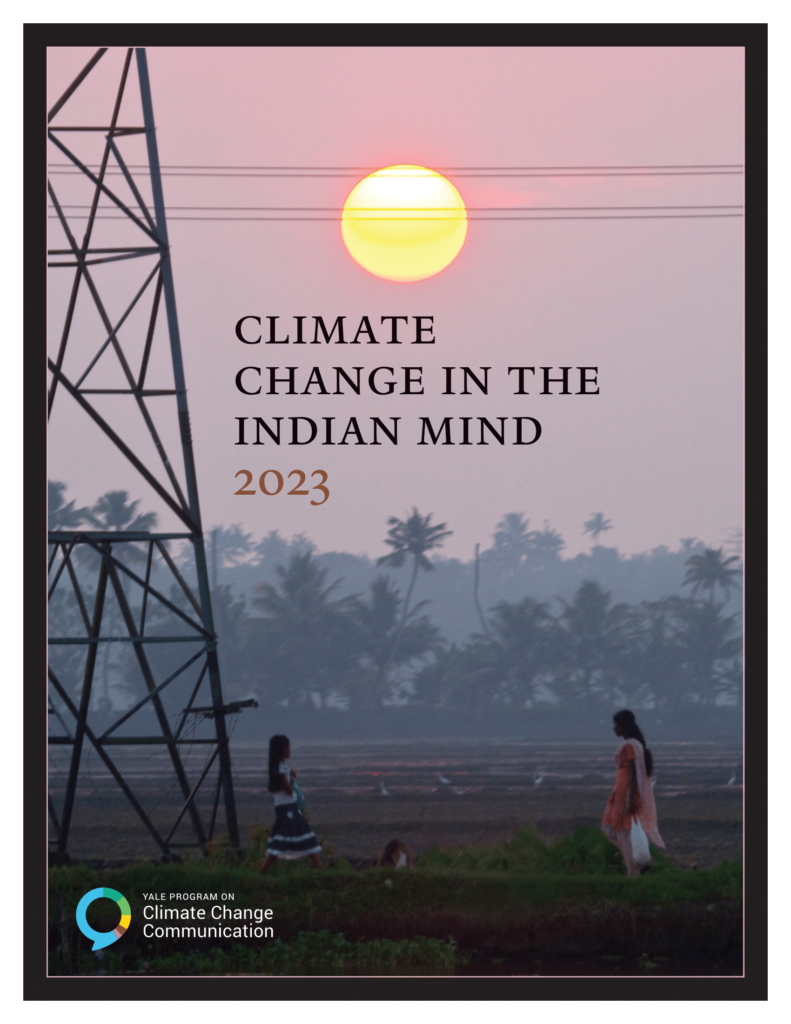
This report is based on findings from a nationally representative survey of adults (18+) in India conducted by the Yale Program on Climate Change Communication (YPCCC) and the Centre for Voting Opinion & Trends in Election Research (CVoter). Interview dates: September 5, 2023 – November 1, 2023. Interviews: 2,178 adults. Average margin of error: +/- 2.1 percentage points at the 95% confidence level.
Principal Investigators:
Anthony Leiserowitz, PhD, Yale Program on Climate Change Communication
Jagadish Thaker, PhD, University of Queensland
For all media and other inquiries, please email Michaela Hobbs ( [email protected] ) and Eric Fine ( [email protected] )
Be the first to hear about new surveys and studies.
Table of Contents
- Executive Summary
- Introduction
- 1. Local Environmental Hazards: Vulnerability and Resilience
- 2. Global Warming Awareness and Beliefs
- 3. Global Warming Risk Perceptions
- 4. Support for Climate and Energy Policies
- 5. Social Engagement with Global Warming
- 6. Willingness to Take Action to Reduce Global Warming
- 7. Vulnerability
- Appendix I: Methods
- Appendix II: Data Tables
- Appendix III: Sample Demographics
Download Full Report
PDF Document
Leiserowitz, A., Thaker, J., Verner, M., Goddard, E., Carman, J., Rosenthal, S., Modala, N., Talwar, M., Deshmukh, Y., Shukla, G., Marlon, J., Ballew, M., & Goldberg, M. (2024). Climate Change in the Indian Mind, 2023 . Yale University. New Haven, CT: Yale Program on Climate Change Communication.
International Attitudes & Behavior
Related Work
Climate note · apr 16, 2024, what do americans want to know about cli..., peer-reviewed article · apr 3, 2024, climate change belief systems across pol..., peer-reviewed article · mar 28, 2024, emotional signatures of climate policy s..., report · mar 26, 2024, international public opinion on climate ..., climate note · mar 21, 2024, the attitude-behavior gap on climate act..., report · mar 7, 2024, climate change in the irish mind, 2023, climate note · jan 17, 2024, support for climate justice across globa..., report · jan 11, 2024, climate change in the american mind: bel..., climate note · dec 14, 2023, global warming’s six americas, fall 20..., peer-reviewed article · dec 13, 2023, what predicts u.s. public support for cl..., report · nov 29, 2023, climate change in the american mind: pol..., climate note · nov 16, 2023, how many americans want an electric home..., report · nov 14, 2023, climate note · nov 7, 2023, who supports climate justice in the u.s...., climate note · oct 26, 2023, which republicans are worried about glob..., climate note · oct 18, 2023, what do americans think is the biggest t..., report · oct 3, 2023, climate change in the indonesian mind, report · sep 12, 2023, climate change in the american mind: cli..., climate note · aug 3, 2023, is distress about climate change associa..., climate note · aug 1, 2023, global warming’s six audiences: a cros..., climate note · jul 27, 2023, americans are becoming more worried abou..., climate note · jul 25, 2023, the prevalence of climate change psychol..., climate note · jul 20, 2023, messages about harms of fossil fuels inc..., climate note · jul 11, 2023, does climate change make you sneeze, subscribe to our mailing list.
Please select all the ways you would like to hear from Yale Program on Climate Change Communication:
You can unsubscribe at any time by clicking the link in the footer of our emails. For information about our privacy practices, please visit our website.
We use Mailchimp as our marketing platform. By clicking below to subscribe, you acknowledge that your information will be transferred to Mailchimp for processing. Learn more about Mailchimp's privacy practices here.
Search Icon
Events See all →
Hands on history.

10:00 a.m. - 2:30 p.m.
Penn Museum, 3260 South St.
268th Commencement

Franklin Field
Vahe Sarkissian

World Cafe Live, 3025 Walnut St.
Wawa Welcome America Day
10:00 a.m. - 5:00 p.m.
Campus & Community
2024 Graduate Leadership Awards
Twelve graduating students are recognized for their service and lasting contributions to graduate student life at penn..
Each year, the Penn honors student leaders who are graduating from Penn with two awards: the President & Provost’s Honor for Developing New Initiatives in Graduate & Professional Student Life and the Dr. Andy Binns Award for Outstanding Service to Graduate and Professional Student Life .
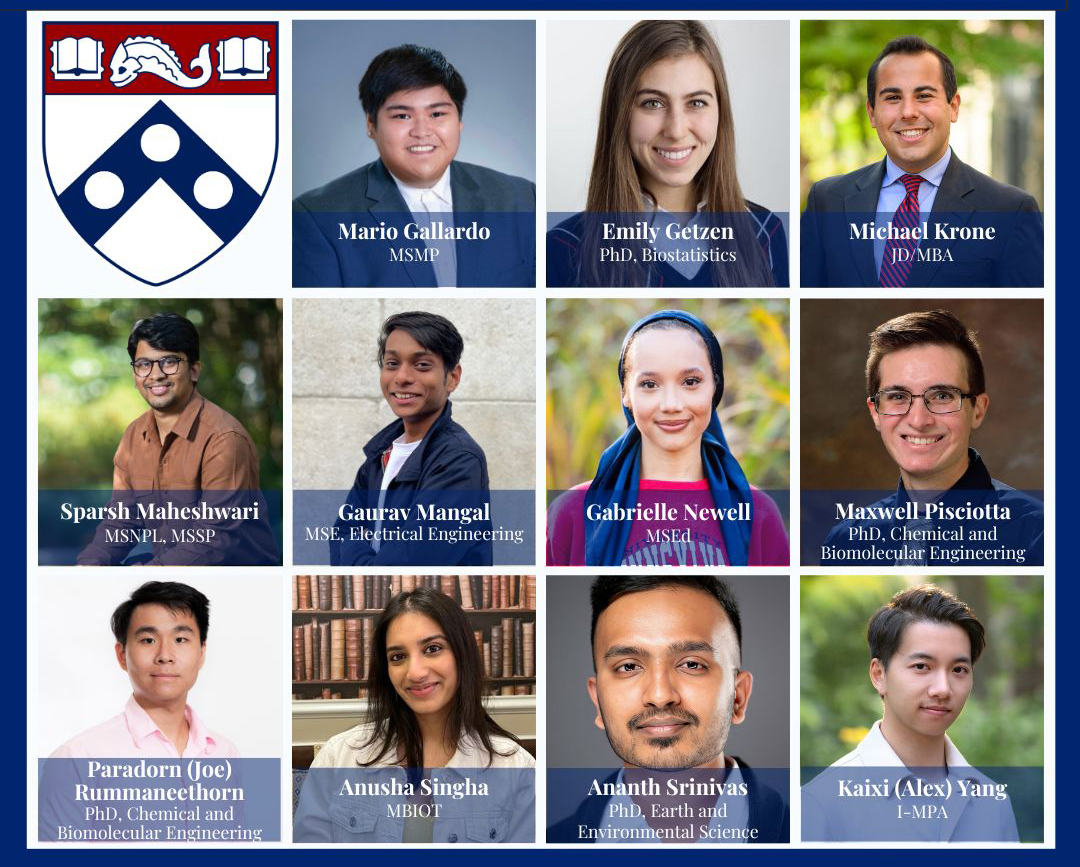
This year, 12 graduating students are being recognized for their service and lasting contributions to graduate student life at Penn. Natalie Delgado, MSW, School of Social Policy & Practice (SP2); Mario Gallardo, MSMS, Perelman School of Medicine (PSOM); Emily Getzen (Ph.D., Biostatistics, PSOM); Michael Krone, JD/MBA, Penn Carey Law & the Wharton School ; Sparsh Maheshwari, MSNPL & MSSP, SP2; Gaurav Mangal, MSE, Electrical Engineering, School of Engineering and Applied Science (SEAS); Gabrielle Newell, MSEd, Graduate School of Education (GSE); Maxwell Pisciotta, Ph.D., Chemical and Biomolecular Engineering, SEAS; Paradorn (Joe) Rummaneethorn, Ph.D., Chemical and Biomolecular Engineering, SEAS; Anusha Singhal, MBIOT, SEAS; Ananth Srinivas (Ph.D., Earth and Environmental Science, SAS); and Kaixi (Alex) Yang, I-MPA, School of Arts & Sciences .
The President & Provost’s Honor for Developing New Initiatives in Graduate & Professional Student Life award is presented to students who have initiated lasting new developments that have enhanced graduate and professional student life at Penn. The Dr. Andy Binns Impact Award for Outstanding Service to Graduate and Professional Student Life is presented to graduate or professional students who, upon their graduation from Penn, have significantly impacted graduate and professional student life through service involvement in student life initiatives or organizations.
Read more at the Graduate Student Center .
Class of 2025 relishes time together at Hey Day
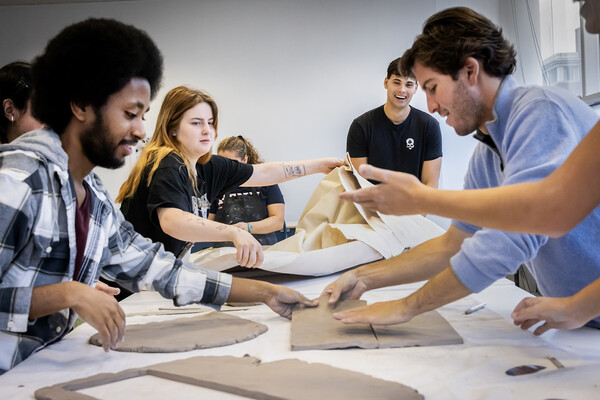
Arts, Humanities, & Social Sciences
Picturing artistic pursuits
Hundreds of undergraduates take classes in the fine arts each semester, among them painting and drawing, ceramics and sculpture, printmaking and animation, photography and videography. The courses, through the School of Arts & Sciences and the Stuart Weitzman School of Design, give students the opportunity to immerse themselves in an art form in a collaborative way.

Penn celebrates operation and benefits of largest solar power project in Pennsylvania
Solar production has begun at the Great Cove I and II facilities in central Pennsylvania, the equivalent of powering 70% of the electricity demand from Penn’s academic campus and health system in the Philadelphia area.

Education, Business, & Law
Investing in future teachers and educational leaders
The Empowerment Through Education Scholarship Program at Penn’s Graduate School of Education is helping to prepare and retain teachers and educational leaders.

‘The Illuminated Body’ fuses color, light, and sound
A new Arthur Ross Gallery exhibition of work by artist Barbara Earl Thomas features cut-paper portraits reminiscent of stained glass and an immersive installation constructed with intricately cut material lit from behind.

‘The Heart of What KM is All About’

- May 15, 2024
- By Erin Broas
Erin Broas is a Master of Science in Public Health (MSPH) Candidate in Health Education and Health Communication at the Johns Hopkins Bloomberg School of Public Health, in the Department of Health, Behavior and Society. She recently won the 2024 University Experiential Learning Outstanding Graduate Student of the Year Award for her work with the Johns Hopkins Center for Communication Programs-led Knowledge SUCCESS project, where she has been working since February 2022, first as a student intern, then completing her field placement requirement with the project, and now working as a student program specialist. Here, she shares some of her experiences.
I have had the privilege of working for Knowledge SUCCESS for more than a year now, a period that has allowed me to grow in my role, to use my skills in communications, event planning and facilitation, and to engage in work that meaningfully protects and advances public health.
Prior to working at Knowledge SUCCESS, I had little formal expertise in knowledge management (KM), a systematic approach to collecting, curating, and sharing knowledge. However, this work has strengthened an existing passion for ensuring individuals have access to the information they need to work and live effectively – the heart of what KM is all about.
In August 2023, I traveled to Dar es Salaam, Tanzania, where I supported a knowledge sharing event on integrating COVID-19 vaccination into primary health care. I helped manage registration activities, troubleshoot problems and took photos and videos to document the event. This was both an extension of work I had done collecting and curating resources on the global COVID-19 vaccination response and a humbling opportunity to learn from professionals actively shaping and driving COVID-19 integration forward, including partners and representatives from USAID, UNICEF, WHO, and Ministries of Health from 11 countries.
I learned from every stage of the planning and implementation processes. Through the agenda setting process, I better understood the tools for structuring learning in engaging participatory ways. One approach I found particularly impactful was Troika Consulting, an activity where individuals meet in small groups to ask each other for help on a challenge they are facing and receive advice from their peers.
During the event itself, I witnessed the swapping of stories – of experiences, successes, and challenges – about COVID-19 vaccination integration across regions and contexts. Post-event, I helped gather what was shared into a report of best practices, lessons learned, and insights that could be shared beyond the attendees of the Tanzania event.
What I took away from this experience was a reminder of the power and necessity of creating spaces for collaboration and peer-to-peer learning. While the participants were all already shaping and driving COVID-19 integration and response in their individual countries, it was incredible to see how enthusiastic they were to work together and to glean what they could from listening to each other’s experiences.
At Knowledge SUCCESS, I have also been part of NextGen Reproductive Health (RH), a community dedicated to adolescent and youth reproductive health (AYSRH). As a member of the coordinating team, I have connected with professionals across Africa and Asia to facilitate trainings on topics ranging from youth and adolescent access to accurate sexual and reproductive health information to behavioral science for better AYSRH programs. We also engaged young professionals in co-creating a training module on meaningful youth engagement that reflects participants’ insights into what KM tools are most relevant for youth working on sexual and reproductive health.
From conducting literature reviews and writing blogs to facilitating virtual and in-person meetings and trainings, my work at Knowledge SUCCESS has both challenged and fulfilled me. As I look toward graduation and to future work in public health, I will be carrying the lessons and experiences I have gained with me. I am also immensely grateful to my supervisors Anne Ballard Sara and Anne Kott, as well as Erica Nybro, Sara Mazursky, Natalie Apcar, and Brittany Goetsch for their continual support, trust, and guidance.
Subscribe to our monthly newsletter
Related posts.
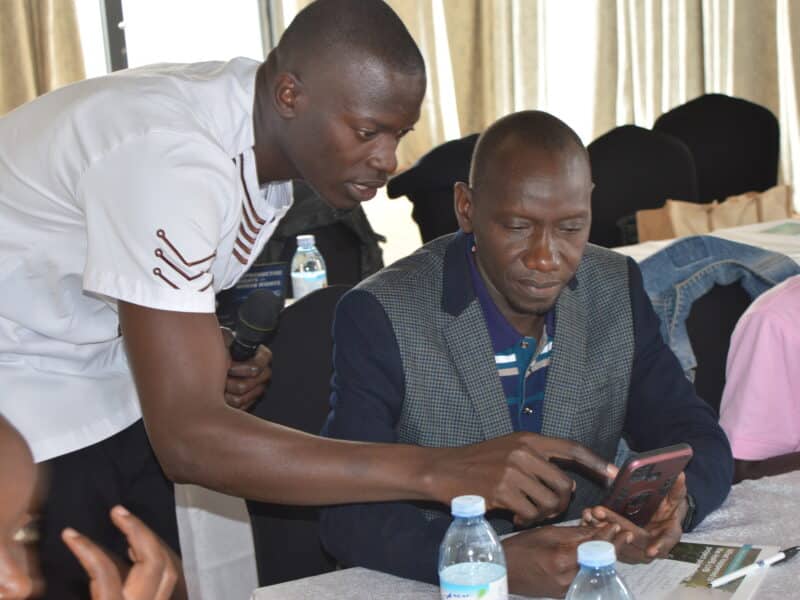
FP Insight Eases Knowledge Sharing Around the Globe

Three Themes Guiding Our KM Work in 2024

CCP Wins Anthem Awards for Work on Knowledge SUCCESS
Subscribe to ccp's monthly newsletter.
Receive the latest news and updates, tools, events and job postings in your inbox every month

Privacy Policy
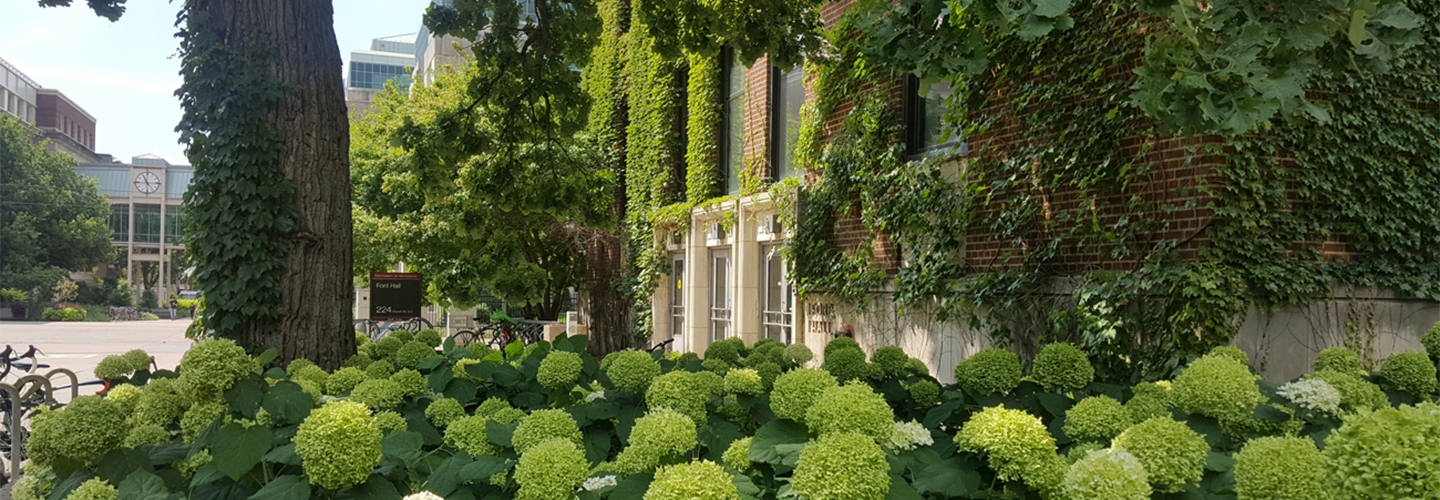
Department of Communication Studies
We explore how communication practices, processes, and technologies impact people's professional, political, and social lives.

Recent News

Minnesota Forensics Team demonstrates passion for their craft
A co-curricular combination of speech and debate, the program offers students a chance to develop close friendships and communications skills.
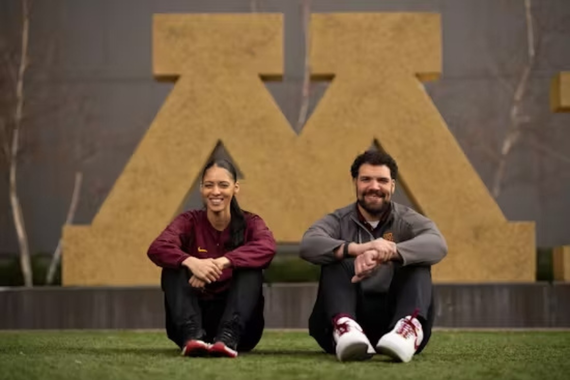
Jeremiah Carter, Kiara Buford steer Gophers through NIL storm
Gopher Athletics Director of Compliance Jeremiah Carter (BA '02, history) and Kiara Buford (BA '11, speech communication)are quoted in this Star Tribune piece about NIL.
UMN students named in annual Top 50 Most Promising Multicultural Students
The American Advertising Federation named four UMN students to its 2024 list, making UMN the second most represented school on the list.
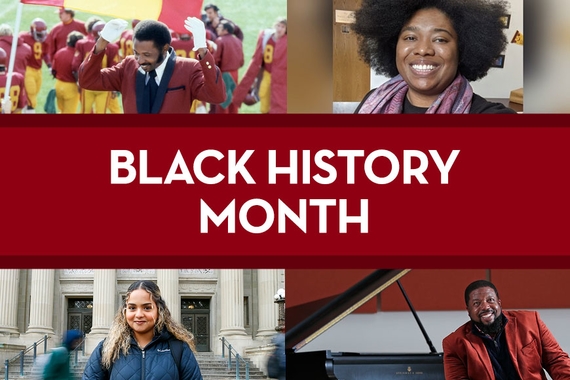
Black History Month 2024
Celebrating members of CLA's community who identify as Black, African American, or African and highlighting the important work being done in Black studies at UMN.
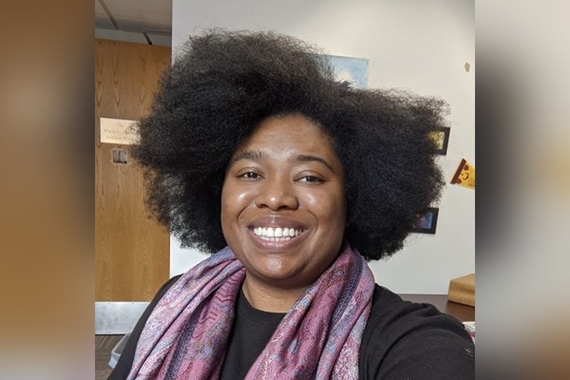
Shifting the Focus: A Positive Light on Black Media Representation
Fink Fellowship awardee, Monica R Evans, seeks to improve Black women’s representation in popular media through her research.
We've detected unusual activity from your computer network
To continue, please click the box below to let us know you're not a robot.
Why did this happen?
Please make sure your browser supports JavaScript and cookies and that you are not blocking them from loading. For more information you can review our Terms of Service and Cookie Policy .
For inquiries related to this message please contact our support team and provide the reference ID below.

IMAGES
VIDEO
COMMENTS
PhD in Communication Studies. Our communication studies PhD program prepares you for a successful career in both post-secondary teaching and research. No matter which concentration you choose, this program emphasizes the connections between sub-fields of communication. Students may apply to the PhD program with a bachelor's degree or a masters.
The Doctor of Philosophy (PhD) is a research degree that prepares students for faculty positions in our core areas of rhetoric, writing studies and pedagogies, and technical communication and for other professional positions that require expertise in writing, rhetoric, and technology. The PhD curriculum is structured to ensure all students have ...
How to Apply. 1. Graduate school online application and fee. Submit the graduate school online application and fee. Select "Mass Communication MA" or "Mass Communication PhD" from the drop down menu. Do not choose "Communication Studies." View Application. 2. Transcripts.
The University of Minnesota's Department of Communication Studies continues a rich heritage of teaching and research that began in 1914 under the leadership of Frank M. Rarig and H. B. Gislason. Today, with 14 faculty members, about 50 graduate students, and over 600 undergraduate majors, the department pursues a wide range of interests ...
Applicants interested in the PhD in Mass Communication/JD degree must submit applications to Mass Communication and the Law School, which are reviewed separately. Applicants are asked to identify their intention to pursue the joint degree in their PhD statement of intent. ... The University of Minnesota is an equal opportunity educator and ...
Accredited since 1978, the program prepares students to work in a variety of professional settings and to meet the challenges of serving individuals with diverse communication impairments. Students choose UMD's Communication Sciences and Disorders Program because it offers the courses, the clinical experiences, and the individualized ...
Graduate Coordinator Contact. Dr. Justin Rudnick. [email protected]. 507-389-5534. The Communication and Media MA program offers students the flexibility to advance into a professional/academic career or into a Ph.D. program.
The University of Minnesota has one of the top doctoral programs for communication. It has an annual enrollment of around 50,000 students, supported by 20,000 dedicated staff and faculty. ... In top communication PhD programs, you are typically asked to participate in an admissions interview in person or online. Is it hard to get a PhD in ...
Founded through the generosity and vision of publisher, diplomat, and philanthropist Walter Annenberg, the Annenberg School for Communication is devoted to furthering our understanding of the role of communication in public life through research, education, and service. Our five-year doctoral program has a strong reputation as one of the best ...
Becca Leback, Broadcast Journalism. The School of Communication & Journalism has established an award-winning presence at both the regional and national level. The School of Communication & Journalism at MSUM offers a variety of majors each balancing the breadth of a liberal arts curriculum with the depth of a professional career curriculum.
ENG 567 International Technical Communication 1-4 credits. ENG 571 Visual Technical Communication 3 credits. ENG 680 Proposals 1-3 credits. COMM 510 and COMM 515 are permission-based courses. Students need to contact the Graduate Studies Coordinator in the Department to check whether the courses will meet the requirements of the certificate ...
The Hubbard School and University of Minnesota Law School offer an MA/JD and a PhD/JD dual degree program in mass communication and law. The University of Minnesota offers a unique opportunity to students who are interested in earning either an MA/JD in three years or a PhD/JD in five years. The Hubbard School is regarded as one of the top ...
Communication Sciences and Disorders. Accreditation Statement: The Master of Science (M.S.) education program (residential) at Minnesota State University, Mankato is accredited by the Council on Academic Accreditation in Audiology and Speech-Language Pathology of the American Speech-Language-Hearing Association, 2200 Research Boulevard, #310 ...
He had recently graduated from Texas Tech University, but Gini still had roughly 40 credit hours to finish. The move away from campus meant a change in major for Gini. The former Creative Media Industries student switched to Public Relations & Strategic Communication Management.
413 Student Services Building 1331 Circle Park Drive Knoxville, TN 37996-0332. Email: [email protected] Undergraduate Advising Phone: 865-974-3603 Graduate Studies Phone: 865-974-6651 Administration Office Phone: 865-974-3031
Minitex and the University of Minnesota Libraries are partnering to participate in Doors Open Minneapolis on Saturday and Sunday, May 18-19. From 10:00 a.m. until 5:00 p.m. each day, we'll invite the public into the Minnesota Library Access Center (MLAC) and the Maxine Houghton Wallin Special Collections Research Center.
About the Minnesota Department of Public Safety. The Minnesota Department of Public Safety's 2,100 employees operate programs in the areas of law enforcement, crime victim assistance, traffic safety, alcohol and gambling, emergency communications, fire safety, pipeline safety, driver licensing, vehicle registration and emergency management.
Jerry Seinfeld, who has supported Israel since the Oct. 7 attack by Hamas militants, delivered the commencement address at Duke University on Sunday.
This report is based on findings from a nationally representative survey of adults (18+) in India conducted by the Yale Program on Climate Change Communication (YPCCC) and the Centre for Voting Opinion & Trends in Election Research (CVoter). Interview dates: September 5, 2023 - November 1, 2023.
Contact: Elaine Hsieh. Department Chair. [email protected]. Kate Lockwood Harris. Director of Graduate Studies. [email protected]. Thank you for your interest in the University of Minnesota Communication Studies Graduate Program. The Department has a long-standing record of excellence and reputation in the discipline, especially in the critical ...
Twelve graduating students are recognized for their service and lasting contributions to graduate student life at Penn. ... Office of University Communications Suite 200 3901 Walnut Street Philadelphia, PA 19104-3608 215.898.8721 [email protected]. Facebook; Instagram; Twitter; LinkedIn; Flickr;
MA in Mass Communication; PhD in Mass Communication; ... Professional MA Program in Strategic Communication. 115 Murphy Hall | [email protected] Office hours. By appointment (hybrid) ... Director, Minnesota Journalism Center Cowles Fellow in Political Journalism. 227 Murphy Hall. 612-625-4381 ...
She recently won the 2024 University Experiential Learning Outstanding Graduate Student of the Year Award for her work with the Johns Hopkins Center for Communication Programs-led Knowledge SUCCESS project, where she has been working since February 2022, first as a student intern, then completing her field placement requirement with the project ...
Black History Month 2024. Celebrating members of CLA's community who identify as Black, African American, or African and highlighting the important work being done in Black studies at UMN. More News. We explore how communication practices, processes, and technologies impact people's professional, political, and social lives.
A severe solar storm this weekend brought a dazzling display of the Northern Lights that could be seen across Europe and as far south as Alabama in the US, while threatening to trigger blackouts ...